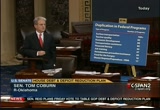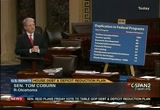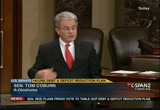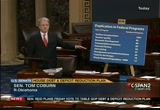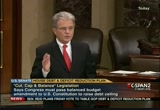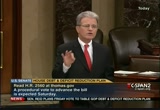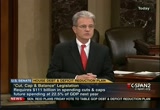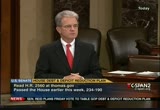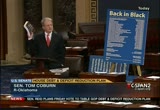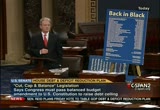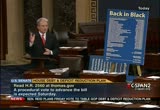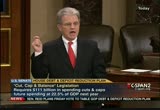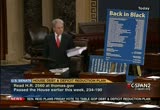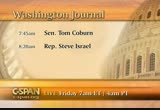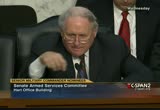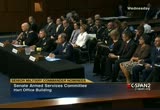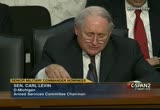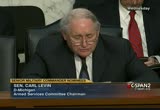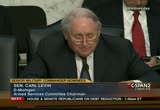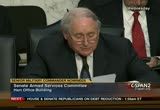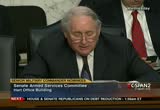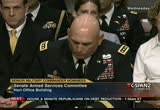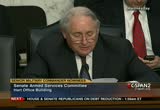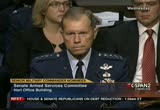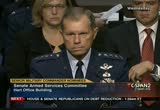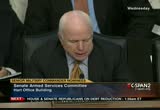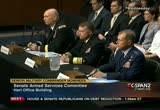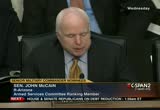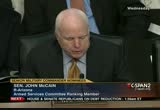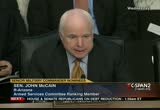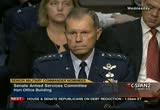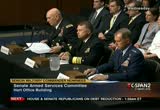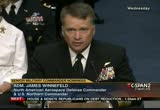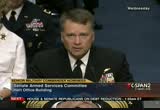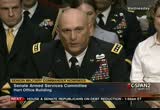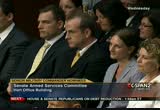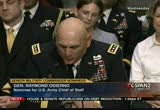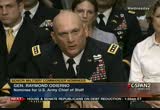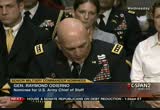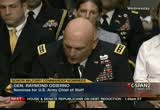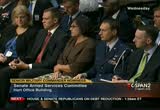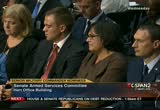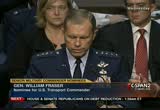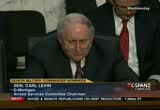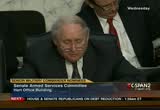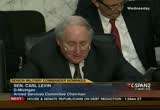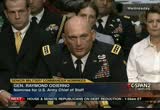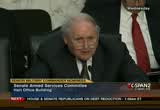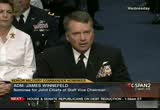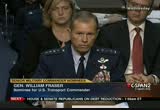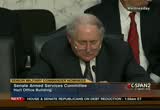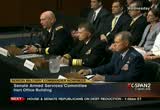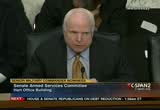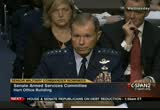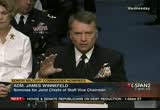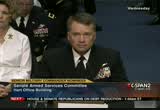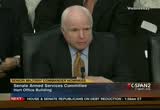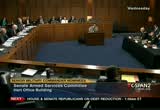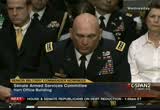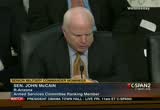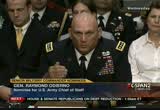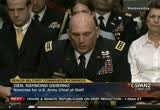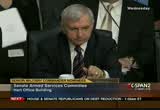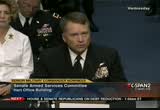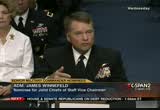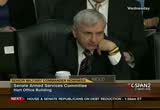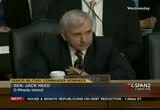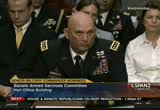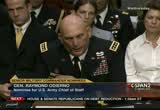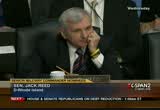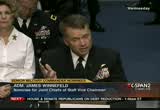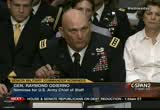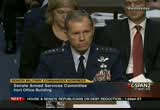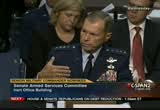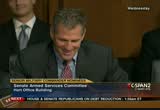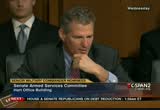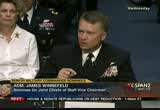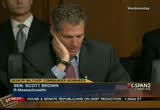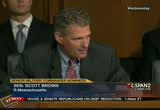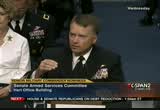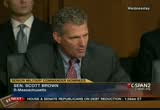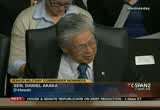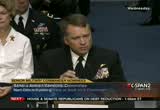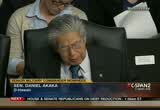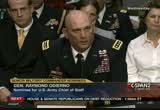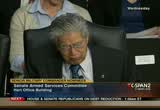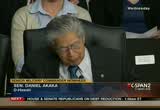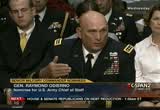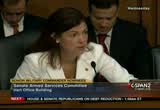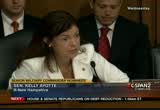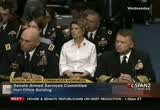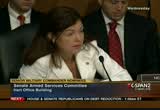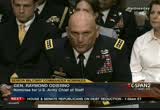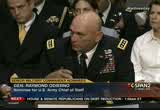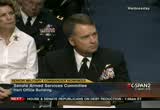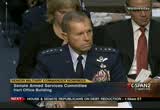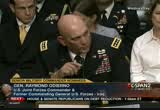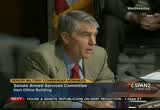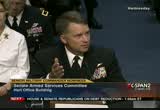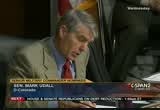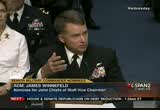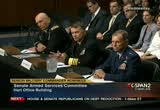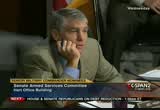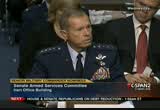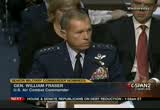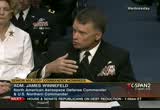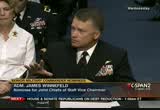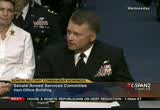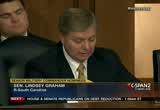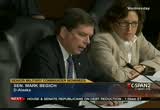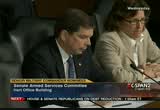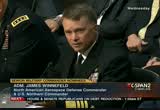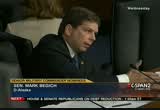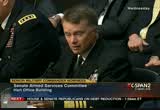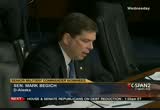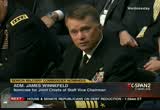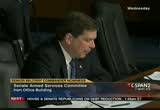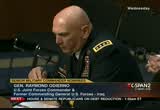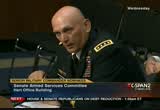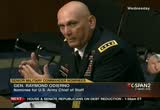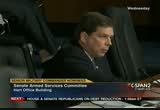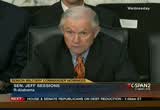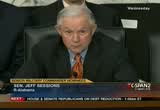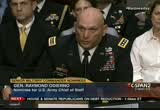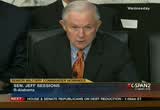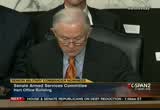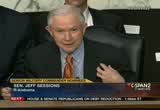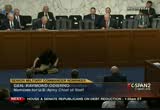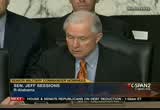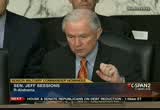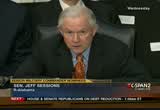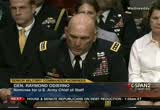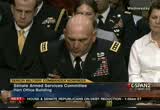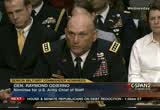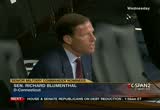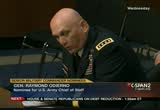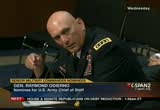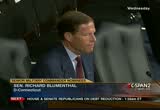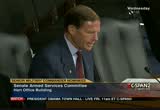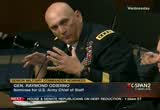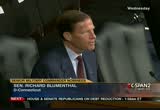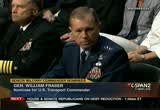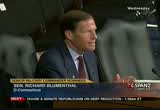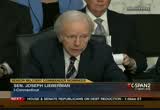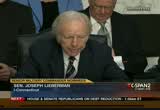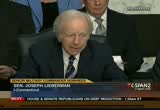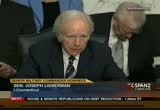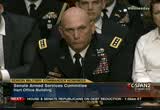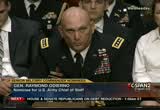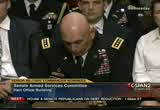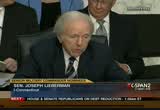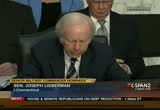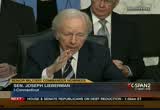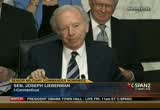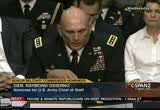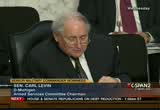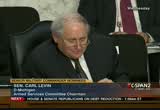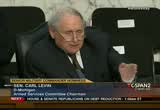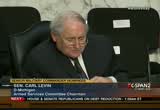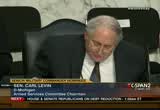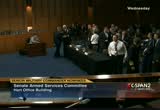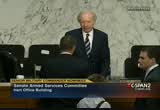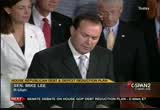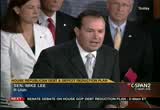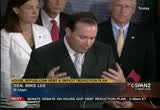tv Capital News Today CSPAN July 21, 2011 11:00pm-2:00am EDT
11:00 pm
themselves and to say we were doing something. we have 88 different economic development programs, $6 billion just in four of them. economic development. on not one of those 88 programs is there a metric anywhere that says it is money well spent that gets a positive result for the country. there is anecdotal evidence that it worked here, it worked here, it worked here, it worked here, ehe soweto know what were doingw we are blowing money that we don't have on things we don't know are working and when we go to vote for them to eliminate them, the senate votes against it because it might bother the political position. it might bother their nexton't s election. do we don't address and do our jobi i'll never forget one of thee committee since i was than laste
11:01 pm
year, two separate times those were brought up to there -- thaw committeesou that were identicae things were already to do in thw agencies and the senator and hei staff did not know it. m and how they not raised objections, we would've created tre agents.or 80 programs for transportation assistant. w 80? need if it is our role, why do add? f and by the way, has anybodyhe 80 measure to see if any of the 80 actually work? the answer is no.on we have non-that have a report they w on whetherer or not they are effective to the polls of what they were set out to do because there is no oversight carried out by congress. werk were so busy earmarking for so many years, we forgot weking. intended to do is still not doing it.teach we have 56 different programs that teach the american people to become financially illiterate.
11:02 pm
asked? the federal government teaching financial litters the one we can bounce our budget. we have multiple programs.the fr ra don't live within a combinede budget. the first principle of financial litters he is living within their means. and yet, we had this many programs?inanci 50sal asked to teach american istizens to be financially. literate? job-training. here's one of my best.s this is correct.that we have 47 job training programs that cost a billion dollars aape year. other. all but three overlap one another. ther not that is with the gao says.d when there's not a metric on when to see if they're working.te, ac associate with her friends, half of them say it's a waste. it's a joke guys i've actually talked to them. and yet we are spending that kind of money in excess ofs?
11:03 pm
$15 billion a year in jobre i training programs. now, there is no question we need job training programs.anhy do we need job-training programs that were. and why would we need 47? so when somebody tells you we can balance our budget, you your ought to go right through them with your thoughts this is you obviously don't know what's going on in the federal preven government.ferent fed almost mention assistants, 20 different federal programs. now, we should be helping people who need ourot help. i'm not denying that. but how we help and the mechanisms of how we hope are te be frugal, efficient and affectf it. i've served in congress -- andn in may 13th year. ars out sixtieths as a congressman, fort your site appear to get a breath of o fresh air and now my sevenh year in the what i know is we
11:04 pm
don't know what we're dealingbut budget.o the it's also obvious looking at thn eysfunction of the senate andat the leadership inenate the senae that we don't want.. we haven't had a budget in two e years. the one thing in a financial and account certainly was the person you have to deal with is where you were incentivewe plan. budget to this body in well over two and a half years. no attempt. what does that tell you? goes back to us not doing what were intended to do because we care more about our position than we care about the country. we have 18 programs to feed the hungry. we have 17 disaster response preparedness.
11:05 pm
17 different programs of which 11 overlap. those now, seeing i didn't bet thoset. that hear the bureaucracy didn't create those. weery one did.f everyone of these programs was created by a member of congress. so you can't name the administration's and you can't blame presidents. what you have to do is blame o congress.ve we have 130 overlapping programs agriculture, 18 overlapping t dr programs, 230 overlapping programs at the department of education, 17 and the department of energy, 30 axman to permitd n human services come at come at t 32 in the department ofhe 53 in homeland, 60 and housing and urban development, 40 metaprogram interior, 50 through the department of justice, 35 and the department of labor, six and the department of state in all econ 180 governmentwide if you look about governmentwide programs, t 180. we just listed the 88 that run
11:06 pm
through for the agencies. is it any wonder that were going belly up quiet and the problem the problem is we've got a let solution now that has come to us not the house and were forward because politically -- politically it's uncomfortable. politically we don't want to allow the people of this countrw to decide whether or not we hadt to live within our means and put a bridle with the dates in ouroe going to continue to destroy the future ofth this country and the prospects for a children anymore. when i came to the senate, i rd came after having read a book called running on empty that was written by demanding that pete peterson. he was bipartisan and has petero produced some of both parties
11:07 pm
and he was absolutely accurate. we're in trouble because parties not her more than the countrythn because control matters more than the country. o political careers matter more than her children or grandchildren.i what's possiblole. a lot of people disagree with within here is $9 trillion of what the house and senate to take about 60%.o my they don't want to vote on theat cut capital balance. b where's youral plan?cu cap, an i listed 625d pages of current,
11:08 pm
specific path elimination and duplication we looked at every t programs throughout the federal, government and every crs report, every oig, on this but inspector general, every allenby reaplookd court in the did every otherpo outside report we could find. the fact is we can solve our soe problems tomorrow, america. we can solve them tomorrow withe good old-fashioned common sense the vast majority of americansoe has been sorely lacking.e but another fiscal crisis. we have a common sense crisis in the body. and in the leadership in congress.ense. we lack common sense. we lack sound judgment and weeed need the hard bid of a bridle put on ice. put balanced o budget amendment to , control less because human nature is human nature.
11:09 pm
and what did we do today will bd back to our bad habits tomorrow. even if we put past cuts, even if we cap spending, if we don't have a balanced budget amendment that forces us to live within the constraints of virus and, we will be b back. can. now what does that mean? futuref that means the future of america is suspect. be.oesn't have to we don't have to go the way of y every other republic. we don't have to fail overwe don fiscal issues.fisc we can cheat history. the american people are the word greatest people in the world because they are a blend of all the people in the world and the desire freedom and opportunity. and that's limited because we limit we've it. it. we threw spending, inattention to detail, failure to do our oversight. we have undercut the potential of our country. let's restorelet's it.tat let's restore it saturday
11:10 pm
morning by moving onto this bill and allowing ourselves to have r debate, offer a amendments and really debate, have with the senate hasn't had been a year hs andn' a half, a real debate abot the issues of t our day at thenb reasons behind it. i what i would caution theemember american people is remember whau martin luther king said here that debate. the then you ask the question, is a popular? cowardice asks the question, is it expedient? the conscience and right and good ask, is it right?have i'll tell you, it's not right to have multiple programs doing the same thing, wasting our kidsnoto future.vers it's noigt htright for the congs not to oversight and eliminateme programs. it is not r hight for us to spel
11:11 pm
money we don't have on things wg don't absolutely need. it's not right for us take to tn control at the children's teachers who havethe the best -- their best interests at heart ws and place it in a bureaucracy that has no compassion event whatsoever, even though it thinks that it does.it's it not not ready. expednt, maybe politically expedient, ane may be popular to some people, but it doesn't make it right. so as you look, here is how yout get $9 trillion. and you can pick any part of that to meet this cut, cap and balance or you can come up with your own. but the fact is nobody wants toy lay on the table but they think. i've already been criticized fof certain aspects of this, people who disagree.endi that's fine. i put i'm planning on defending everything i've put in here. but the best of my knowledge ina a great staff that sent came thousands upon thousands of way hours, we came up with a way to solve america's problems and wen
11:12 pm
can do it.ght, america can be bright, can begrw growing, developing jobs if wehe get the government out of the my way of limit the role of the federal government. if my colleague from delaware, i one of my great friends. and you hear that that a lot here, but he is a great friend. it's not the conventional commoe greeting. and i believe i'm over my time. i will be back to the fuller tos finish this conversation. but america needs to know we c don't have any problem wean cano fix. but we lack is leaders who will fix it.'s a that's a deficit. it's a deficit of courage. it's a deficit of well. and with that, i yield the floor. the mach
11:13 pm
11:14 pm
>> what would that have been like to have met these people when you didn't have the ending? >> i started looking for characters through his eyes i could tell that story is. americans. and that's when i stumbled upon william e..come in the first ambassador >> now, a hearing that u.s. military commander nominees. senators on both sides of the aisle one senior military commanders for budget cuts are coming for the pentagon. the senate armed services committee is chaired by michigan senator, carl levin. this is two hours.
11:15 pm
>> good morning, everybody. the committee meets this money to consider nominations of three outstanding military officers for positions of leadership and command among the most important in the department of defense. our witnesses today are admiral cmb winnefeld come u.s.a. to be vice chairman of the joint chiefs of staff. general raymond odierno to be chief of staff of the united states army and general william fraser the third u.s. air force to be commander of the united states transportation command. we thank each of you for many decades of dedicated service and your willingness to continue that service to these positions of great responsibility and challenge. emma may also extend on behalf of the committee are thanks to your families who support has been so important to the success do you have and his support for
11:16 pm
you makes a difference for the nation of flow. as is a tradition that we particularly enjoyed, we would invite each of you to introduce any family members or friends who may be your today with you during your opening remarks. one is the first section all three of our nominees will carry out if confirmed will be immediately implemented the reduction of u.s. forces in a can of and by 10,000 by the end of this year and removing the rest of the 33,000 u.s. search wars from afghanistan by the end of the summer in 2012. these reductions are part of an ongoing process of transitioning increasing responsibility for afghanistan security, the afghan security forces, which by 2014 would have leader was on stability for security throughout the country. the chorus which the company
11:17 pm
says provides a strategy for success in afghanistan. the afghan security forces have increased by almost 100,000 since the president announced the surge in december december 2009.afghan army will expand by another 70,000 security forces by the time all of the u.s. surge forces are brought home by september of 2012. the growing capabilities of the afghan security forces provide the afghan people would want melter of afghan elders have asked eunice and told me that they want the most, which is the ability to secure their own country themselves. having ask you forces in the lead puts the lie to the taliban propaganda that international forces are there to occupy afghanistan.
11:18 pm
the afghans taken over their own security is the key to the strategy to success in afghanistan. admiral sandee winnefeld serves as commander of the north american aerospace defense command, norad was candidate. the capacities have been responsible for defense and homeland. military support to civil authorities to domestic emergencies as well as aerospace warning and control for north america. in its current capacity, he is the combatant commander responsible for the operation from the gmd mission. if confirmed as space chairman of the joint chiefs of staff, he would have a number of key roles and responsibilities related to missile defense. we will be interested to hear admiral winnefeld views on whether we should demonstrate correction of the two recent gm
11:19 pm
flight test failures before resending production or delivery of the kill vehicle for the gmd interceptors. the joint chairman of the chief of staff has a wide range of response abilities come including playing a major role as chairman of the joint requirements oversight council, jroc for future acquisition programs for monitoring the progress of ongoing programs. as we all know, most of the major acquisition programs that the department of defense are over budget and behind schedule. we have 35 joint strike fighter is one dramatic example. as the defense budget is reduced, and the inability of the department to acquired contract nurse to provide needed systems and equipment on time and on budget becomes an even more significant problem than it is already. a significant challenge related
11:20 pm
to the vice chairman of acquisition responsibility is in the area of cybersecurity. all of the systems equipment support intelligentsia and almost everything else the department of defense does relies on efforts, making sure the networks can support the operations reliably would be a large part of admiral winnefeld's responsibility. there also is used such as windows a cyberattack of entities require or justify u.s. defensive reaction, cyberor otherwise. the vice chairman will surely be involved in addressing that issue as well. if confirmed, admiral winnefeld will serve as a member of the nuclear weapons council, producing and maintaining nuclear weapons as expenses and technically challenging. today the nuclear weapons council is participating in the design of the nuclear deterrent
11:21 pm
for the next generation. if confirmed, one of the challenges with the two keep both the cost and scope of the maintenance and modernization within reason. and of course, the central part of the vice chairman's role will be to act as chairman of the joint chiefs and the chairman's absent. general odierno is well-known to this committee. he's appeared several times as a commander of u.s. force in iraq and was recently nominated for his current position as commander, u.s. joint this command. general odierno is going to demand that this battle tested and proven stretch by 10 years of war. the army has met every challenge but the courage, dedication and professionalism for which they in which they apologize are profoundly grateful. over the next four years under general odierno is leadership
11:22 pm
and the army will deal with many cheery and new challenge. first and foremost, the army must continue to meet the demands were trained and ready forces, support of operations in afghanistan and iraq. as the commander with operational experience, will be interested to hear general odierno's views and continuing demand for support of operations , preparation, readiness and performance and how he would ensure that we continue to meet this challenge. the future beyond operations in afghanistan and iraq also questions about what we don't need the army to do, how will be structured and equipped and how we manage to keep the floors that is as good and ready as it is today, modernizes to stay relevant for tomorrow, that is at the same time affordable. we will be interested to hear general odierno's views on how he would deal with the budget
11:23 pm
pressures that are already being felt throughout the defense department and no doubt will result in funding challenges over the next several years. perhaps the greatest leadership challenge that general odierno will face is the reduction in planned for completion by 2017. the army has reduced his eyes many times in its history. most recently at the end of the cold war and operation desert storm. the army must plan be able to manage its reductions in the company for structure changes to avoid hollering out units and remain as capable as it is today. we are interested hear general odierno's thought on reductions, for structure changes in how best to manage the change without losing the armies hard-won fighting match. finally, the army must continue to work as hard as possible to deal with the human cost of soldiers and their families from
11:24 pm
the pressures and consequent is that an army and continuous combat for 10 years. the areas instituted significant progress to improve deployment predictability and reduce the stress in multiple rotations on soldiers and their families, improve care for wounded soldiers and their families and strive to do with the heartbreaking incidence of suicide that continuing the active-duty force and has been increasing and our national guard and reserves. the committee will be interested to hear general odierno's assessment had been planned for the army's efforts in those areas. general fraser will also face critical challenges in his new position. the strategic ability of our armed forces enables us to project power anywhere around the globe. the u.s. transportation command, which encompasses air force mobility command, navy seal of command in the army surface deployment and distribution
11:25 pm
command is the linchpin of the strategic mobility. general fraser will also do at the district components of the private transportation sec dirt, including the red rose, commercial air carriers to participate in the federal reserve air fleet program and commercial ship operators. one area where general fraser will be immediately valued his challenge of logistical support the afghanistan theater of operations concerns about overreliance and sometimes tenuous surface lines of communication through pakistan for logistic support into afghanistan have fled over the past couple years the establishment of the northern distribution network through central asia. however, these northerners may need to be expanded to allow increased movement into an increasingly out of afghanistan that we are to maintain the quality and timeliness of that support to our afghanistan
11:26 pm
forces people be interested do hear general fraser's views on that. and again, our deepest thanks to you and your families for all the hue of done will do for the nation in the days ahead. senator mccain. >> thank you, mr. chairman. i woke on general odierno, admiral winnefeld, fraser a special thanks to their families and congratulate them on their nominations. i particularly want to recognize mr. tony odierno at, a distinguished wounded warrior and his hearer supporting his father. general odierno, i strongly support your rep nomination to the net chief of staff of the army. her critical role in iraq and a note you are one of the very few officers to have commanded the division court army leveled during a single conflict to view a unique perspective on capabilities of u.s. forces as you execute, maneuver
11:27 pm
counterinsurgency operations. your service as commander of the fourth infantry division as commander multinational force iraq and u.s. forces iraq was instrumental in implementing the surge strategy in turning the tide of on iraq. your career of army service in your various joint assignments currently has commander u.s. joint forces command has provided you with an essential understand and of counterinsurgency operations, joint operations and most importantly, soldiers and their families. we know that soldiers come active-duty reservists and national guardsmen and their families have served out the end with a single-minded focus on the very under the most stressful conditions as the army has transformed itself into an expeditionary force while meeting the demand of two wars. we're enormously grateful for service and sacrifices. the human cost of combat has been great.
11:28 pm
the comprehensive study completed last year under the army vice chief's direction underlined the effects of continuous combat rotation and the work that has to be done. i applaud the efforts of senior military leaders in the army and dod to understand these problems, provide the best medical care possible and responding to the needs of wounded soldiers and two assists families of all soldiers if you are confirmed, there will be no higher priority than continuing this work. within the current fight in afghanistan and preserving the hard-won gains in iraq must continue to be the army's top priority. in a few short months on the job, general dempsey identified resolving the future mix of personnel and equipment as the army's top priority. in this regard, you will be required to deliver honest assessments and make hard choices. as the army decides upon the optimal number and type of vehicles and equipment and
11:29 pm
recapitalization and modernization, or to look carefully at recent history. over the last decade, the army and bart on a number of developmental procurement and modernization programs that were subsequently de-scoped, read baseline or canceled outright. i am very interested in the specific steps you intend to take the earnest kermit track record. the committee will be interested to know your views on the continued drawdown of forces in iraq and wonder what conditions you would advise during u.s. troop presence. i have expressed my concerns about the size and pace of the drawdown of troops in afghanistan. i also want to hear your army manpower for 2000 soldiers over the next three years and another 27,000 in future years will absurd be in a growing population of non-deployable
11:30 pm
soldiers. as you take the reins of chief of staff, we need to know how much risk the army in individual units and soldiers are being required to absorb in this challenging environment. admiral winnefeld, congratulations on your nomination to be the next vice chief. i think your city very high standard as commander who is northern command improving our homeland defense capabilities and enhancing security on our southwestern border. there are still many challenges in this regard and i hope that as vice chairman of the jcs, you will continue to participate in this important work. stepping into big shoes following general carteret. i thank him for his great service and i hope you will continue to tributaries expertise to national security debates in the future. i urge you to focus immediately upon confirmation on improving the acquisition process. the department and its industry
11:31 pm
partners have stumbled again and again in producing weapons systems at affordable costs that without question the services desperately need. your involvement is also needed in furthering cyberdefense strategy and nuclear strategy in ensuring we achieve success in the middle east and libya in ensuring the demand for budgetary reductions does not result in loss of capabilities in the military diminished and unable to respond the defense of our vital national interests. general fraser come you are following in the steps of two outstanding leaders that u.s. transportation, general mcnabb and general schwartz. i'm sure you'll receive excellent mentoring and advice from them. last year, dod released the mobility capabilities and requirements study 2016 that found the department's plan mobility capabilities are sufficient to support the most
11:32 pm
demanding projector he requirements. specifically, the study found large cargo aircraft air lift capacity exceeds the peak demand and all the peacetime and wartime scenarios consider, which covered a broad doctrine of military operations. the study concluded that the military needs only 264 to 300 large cargo aircraft, eliminating the 360 large cargo aircraft for restriction would allow the air force to retire an additional 15 t. fivea aircraft and provide substantial savings by freeing up billions of taxpayer dollars over the next few years. given the current climate of fiscal austerity, which requires we look to all corners of the defense enterprise to determine how they dod can connect those more efficiently, this is a move in the right direction. i think our witnesses again for their service and their willingness to serve in these key positions. thank you, mr. chairman.
11:33 pm
>> thank you very much, senator mccain. let me now called first on admiral when i felt. >> chairman levin, senator mccain and distinguished members of the armed services committee, i am very honored to appear before you today is the president's nominee to become the vice chairman of the joint chiefs of staff. this nomination is ashley humbling to me when i considered the exceptional officers who had previously held this position in a very energized by the opportunity to continue serving alongside america's men and women in uniform. it's an honor to appear alongside to special colleagues in general race odierno and fraser in high regard. if we are confirmed, i look forward very much to the opportunity to continue working close with them in the future. it goes without saying we as a nation face many serious near-term and long-term challenges and many of them fall
11:34 pm
inside the military flame. if confirmed, i will do my part, do my best to assure many ongoing operations around the world are concluded successfully , to assist the secretary of defense and the chairman and crafty and away ahead for the department to include operating in a challenging budget environment, to continue improvements in requirements and acquisitions process that senator mccain referred to and also maintain the best possible stewardship of the young men and women entrusted to our care. as such, i look forward to working with not only the senior leadership of the department of defense in washington, but also with combatant commanders and friends and allies around the world and also key members of the executive branch and congress to include the members of this committee. in doing our best to make sure were defending the american people. if vancouver, i'll be joined in washington by my family who
11:35 pm
unfortunately could not be here today and my incredible wife, mary who is so supportive of military families and my two sons, lj and john at and who i love dearly and i'm very proud of. i parents are also unable to be here today, but i will forever be indebted to them for their love and support and also for their service together with a 30 year navy career. thank you again for the opportunity to appear before you today and the ongoing support it you and the hard-working committee staff continue to provide to our men and women serving in uniform. i look forward to your questions. thank you connoisseur. >> thank you, admiral. >> chairman levin, senator mccain, others said the armed service committee, cheney met for the opportunity to appear before you today. before i get started, and like to introduce my family. first a day to start out with my wife, linda who has been by my side for my entire 35 year
11:36 pm
career. she has dedicated herself to soldiers and families, leading family readiness groups, brigade division and corps level, volunteering, leading to ensure our soldiers and families are taken care of. most importantly, i believe she served as role model for our junk passes throughout the military. over the last three or she is dedicated herself to champion in providing pet therapy 200 soldiers in taking this on is a great opportunity that helps them to move forward with their life. she is done all this will be and another 33 children and three grandchildren can i couldn't do without her. she's been by my side the whole time and she is frankly my personal hero and partner. i'm also blessed with three wonderful children, all here today. first, my youngest son michael who is a senior at texas tech university and is probably have to live with more deployment than any other child in recent years and has done so well in
11:37 pm
helping my wife as they work through these together. my daughter, katie and her husband make here today from baltimore. katie is a mother and also works an interior architecture. they live in baltimore and are so supportive of me. and finally, my oldest son tony, many of you know a west point graduate, served in iraq and was injured in 2004. you set such an excellent example for all of those theories perseverance and dedication in today, tony is married to danielle. unfortunately, she couldn't be here today. she's watching her twin boys and could make it out today. he works for the yankees, but he continues -- [inaudible] [laughter] >> he continues to dedicate himself to wounded warriors as he is on the board of directors of the wounded warrior project. it's an honor for me to have been there as they continue to serve me in our country. mr. chairman, if i could go on,
11:38 pm
with the last 10 years army has proven itself, arguably the most difficult environment this nation has ever faced. our leaders at every level have displayed unparalleled ingenuity, flexibility and adapt ability. soldiers have displayed mental and physical toughness and courage under fire. the entrance from the army and the most versatile, have shown that the deployable and sustainable strategic win for us in world today. i'm proud to be part of the army with the opportunity to serve at these great men and weapons and i'm humbled and honored that i've been nominated to be the 30th chief of staff of the army. but today is like no other in our history. it is a time of uncertainty and historic change. we face a multitude of security such as transnational and regional terrorism in places like yemen, amalia, nor that are cayenne pack of and tribal areas. we have uncertainty surrounding the earth sprained in the
11:39 pm
proliferation of nuclear weapons than we face the challenges of rising powers. most importantly, all of this is underpinned by your own fiscal crisis. i know if confirmed, will face a difficult resource decisions within the department of defense and as we determine those essential care or estates and capabilities, which we need in our joint force to meet security challenges, i pledge i will work with everyone to make sure we come up with the right answer and mitigate the risk associated with such. but i do have one word of caution. we must avoid our historical pattern of drawing down too fast and getting too small. especially since our record i predict the future has not very good. as they make difficult resource decisions, we must be thoughtful in understanding the risk we incur to our nation's future security. today the army must continue to provide trained and ready force is to ensure we prevail in our current missions in iraq and
11:40 pm
afghanistan. in the future, we must ensure the army remains their national or so decisive action and highly relevant active force against the fact from conflicts. in order to do this, we must sustain our volunteer army today and in the future, providing depth and versatility to the forest. an army more efficient and it complained that provides greater flexibility for national charity decision-makers in defense of our interests at home and abroad. finally and most way, if confirmed, it's my moral responsibility as chief of staff of the army to be the number one advocate for our soldiers and their families. it is their dedication and sacrifice that has earned the respect and confidence of the american people as they continue to put their lives in harms way for nations security. for what to rity. for what to close by stating my appreciation to the committee, its unwavering support of soldiers and families throughout the last several years.
11:41 pm
we couldn't do without the great cooperation. i promise you confirmed all dedicate myself to carrying out my duties to the best of my ability and continue to work openly with congress to support our war fighters. i look forward to answering your questions. thank you, mr. chairman. >> general, thank you so much. general fraser. >> general established members of this committee, i am honored to appear before you today is the president's nominee to be the commander of the united states transportation command. it's also a privilege to join to find officers on this panel, admiral winnefeld and john r. rice at her with whom i worked closely not only in my current command, but in previous assignments. it is an honor and privilege to join them today. this morning, i enjoyed this i have been throughout my 37 years old her career by my wife, beth, with whom i have been blessed to
11:42 pm
this extraordinary experience of this great nation. does an iron teeth humbled to serve at the terrific men and women who have volunteered to serve our nation and were grateful for this opportunity to continue serving if confirmed in this new capacity. as you all well know, the military is truly a family and bev and i are proud that our families been a part of it. our son mack served in states marine corps. our daughter ashley is the military spouse of an air force top serine may have blessed us with six grandchildren. throughout my career, i've become increasingly appreciative of the team after required of all military families. all families of our soldiers, sailors, airman, marine and coast guard members help us perform our mission on a day-to-day basis and make any sacrifice is. the families of our servicemen
11:43 pm
were they make these tremendous sacrifices are doing it for their house in, why is, fathers, mothers, sons and daughters to answer our nation's calls and i thank them for their priceless contribution to our freedom. if confirmed, that photo to join the united states transportation command family, the more than 145,000 men and women dedicated to delivering, sustaining and returning our forces. in my current role as commander of air combat command, i know the critical importance of rapid, efficient and timely global logistics. i also understand that the heart of that capability is the innovation and creativity of thousands of men and women who really make it happen. if confirmed, i pledge to enable our total force, soldiers, sailors, airmen, marines, coast guard in civilian team members to build on the superior legacy of my friend and colleague,
11:44 pm
general duncan mcnabb. he has triggered a division based on making our forces more effective and more efficient to rapid in response to global, logistical exclusions and non-governmental, commercial and international partnerships. we will always deliver. finally, if confirmed in the forward to working with this committee and all members of congress to ensure the united case transportation command will continue to provide world-class support to all of our incredible men and women. once again, i am humbled to have been nominated by the president for this position and i appreciate the trust and confidence in the secretary of defense and the chairman of the joint chiefs in considering me for this command. i am grateful for the opportunity to appear before you today. in considering me for this command. i am grateful for the opportunity to appear before you today. >> thank you very much. general, let me ask for the opportunity to appear before you today. >> thank you very much. general, let me ask you the standard questions. do you a tear to applicable laws and regulations covering
11:45 pm
conflicts of interest? >> yes, sir. >> do you agree with those from the administration in power? have you assumed any duties are undertaken actions appear to present the outcome of the confirmation process quick >> no, sir. >> will you ensure staff complies with deadlines established for requested communications including questions for the record in hearings? will you cooperate in providing witnesses and briefers in response to congressional requests quick >> yes. >> will those benefits be respected for briefings? do you agree if confirmed he will appear to testify in compound request for this committee quite >> yes, sir. >> copies of her forms of communication and timely manner when requested by a duly constituted committee or consult with the committee regarding basis for any good-faith delay or denial of such documents? i thank you all. let's have an eight minute first round today.
11:46 pm
on june 22nd, president obama announced his decision and the united states would draw down its forces in afghanistan by 10,000 by the end of this year and the remaining 23,000 u.s. surge forces by the end of summer 2012 for a total of 33,000. let me ask each of you. are you comfortable with the president's decision relative to those reductions? >> yes, sir command. for general od or narcotics >> yes, sir, i am. >> general odierno, the secretary -- former secretary, secretary gates made a speech at west point last february saying that the army will be increasingly challenged to justify the number, size and cost of the heavy formations in
11:47 pm
the first major challenge will be how to structure it self, how to train and equip for the extraordinarily diverse range of missions that will face in the future. now, there were a number of other assertions here by secretary gates and i think you are familiar with them. basically, how would you react to a statement that the army was difficult to justify in size, structure and cost to the leadership of congress and the country? >> thank you very much, mr. chairman. i have actually had several conversations with secretary gates about this. and what i believe he was doing was challenging all of us as leaders to make sure that we are looking ahead and we understand the future of conflict they been informed by the past lessons we have learned in conflict and because of that witness make sure we shape our army for the future to meet what we believe
11:48 pm
will be her future requirements. it's about as identifying the right capabilities and cared eristic sweeney. i think what we have to do is become more agile, more adaptable and we have to be able to respond to a wide variety of potential capabilities for national command authority will need the army to do. he is challenging us to make sure we do that as the conductor assessments. i am confident the army, as we are looking both today and in the future, are conducting detailed to decide what we should look like us in the forward and i will report this out as we review and make progress in this effort. >> thank you. when they ask you, admiral, a couple questions about afghanistan and pakistan, as you undertake these major responsibilities. how important is that, in your judgments of the success of our counterinsurgency campaign and not in a stand, do we maintain the process of transitioning
11:49 pm
more and more response ability to the afghan security forces for their country's security? >> it is fundamental to the entire campaign that we transitioned responsibility for security to the afghan national security forces. the ultimate goal of genistein been establishing adequate stability so that al qaeda and other groups can return and have a position from which to attack this country and ultimately the afghans will have to step up and take that kind of responsibility for themselves. i think it's fundamental to the campaign. >> what are the challenges to that campaign is pakistanis remaining relaxed chance to take on the haqqani network. you have an assessment as to why they are refusing to take them on? >> of course, pakistan is a very difficult partner and we all know that. we don't always share the same worldview or the same opinions
11:50 pm
are the same national interests. i believe it's unfortunate that pakistan years ago made a decision to go down a very risky road of using proxy groups to carry out some of its desires to protect what he views as its own national interests. among those groups have been the haqqani network. we need to keep continued pressure on pakistan come using all elements of the pressure were able to apply to it really should be a friend to get them to realize that the haqqani network poses a threat to their own country and take the steps we've asked them undertaken that they need to take in order to eliminate that as a threat not only if they pakistan, that importantly for us in afghanistan. >> relative to pakistan, we've got a real problem of resupplying our forces in afghanistan, particularly if the
11:51 pm
pakistan lines of communication are decreed it or threatened or interrupted. and when we met general fraser earlier, you indicated that we might have to reply -- to rely more heavily on the left with the intratheater as the last leg of support for afghanistan operations. can you tell us about that memo would be the problems associated with relying more heavily on.com nation is the last in the intratheater air lift if we have to resort to this? >> one of the things in preparation for this that i've taken a hard look at is the expansion would add to the northern distribution network and we have made progress there. if confirmed, i will continue to work that very aggressively to expand the opportunities they
11:52 pm
are as an alternative mode for getting good into the theater. we understand the challenges that may be presented with pakistan to shut down and therefore rearward regard to expand network through the use of inter-theater lift. but once getting supplies to the ports, working with the countries in the persian gulf, to web access to ports will allow us then to the ports and move them on from there with intratheater list. if he shuts down, i am confident will feel to satisfy requirements to the theater. >> thank you. general odierno, what is the operational urgency to field a new ground combat vehicle in seven years and how do you propose to manage the program
11:53 pm
risk which is associated with that kind of a fairly aggressive schedule through technology development or otherwise? >> thank you very much. the army for almost 10 years now has been on a path of a developing capability for life forces come in medium forces with the strike were sustaining with the battle tank and the bradley fighting vehicle. there was a plan at one time for us in the future of 2020, 2025 to convert the fcs. we know the problem of the program specifically was not successful. and so, we have to cost a look at what is going to be the vehicle of the army uses as we bring our force together for the future? one of the potential vehicles is a ground combat vehicle.
11:54 pm
we have to continue to assess colicky requirements established for the ground combat vehicle to see if it will meet the future requirements pc for our army in the future that we are constantly assessing an work and a multi-commute to work with the committee on not. spirit okay, thank you all. senator mccain. >> thank you, mr. chairman. general fraser come to follow-up on chairman motives questioned about what would have been his pakistan cut off supply routes, what% of our logistics now goes to pakistan? >> sera come it's my understanding that approximately 35% boost to the ground and the others moving to the northern distribution network, coupled with also lift as we bring in supplies a year. >> if you have to -- how long would it take you to make up for that 35%? suppose tomorrow pakistan shut off the supply routes, how long would it take you to a chess to
11:55 pm
keep the same level of logistics into afghanistan? >> if confirmed, all certainly delved deeply into that. >> a campy right-of-way. you know that much about it. >> yes, sir. >> during the period of time were it not have the normal logistics supply. >> sera come in my business to the theater, >> tour false, they would be a period where we would not be able to maintain the same level of supply? >> , that's true. >> and if we have to use air lift of the air lift is approximately four or five times more expensive as the present mode of ground transportation, right? >> sera, redoing everything we can to reduce the cost. >> is it true that is three, four, five times more expensive to use air to carry these
11:56 pm
logistics than the president nodoz overland? >> sera, hotels deeply into the cost figures. it is more expensive to go by air. >> thank you. admiral winnefeld, how big of a threat to the drug cartels in mexico opposed to the very government and the country of mexico? >> i don't think they pose an existential threat to the central government of mexico, but it is very clear in particular regions of mexico that they are co-opted elements of the government in the mexican government faces a serious challenge in those areas. in terms of good democracy of mexico, i am not overly concerned about that. >> t. believe there is any law enforcement institution in mexico that is untainted by corruption? >> the higher you go in a law-enforcement realm, the less tainted they are. i have a lot of confidence -- were confident which is the
11:57 pm
federal police was made tremendous strides, working very hard. as the closer to the municipal level, there's a great deal of corruption, yes, sir. >> you agree with the general accounting office assessment that our border is about 44% operationally secure? >> i don't have any facts to dispute that conclusion. >> is it your view that there is some parts of our border that are still not operationally secure? >> in terms of operational secure company be able to shut out the flow of illegal immigration, i would agree with you. >> maybe not completely, but operational control come i think you and i. bush are to edition. you might guess, >> or parts of our border you agree or not operationally secure. >> i would say they are definitely part at every challenge in in terms of operational security, they would hasten to add there's been progress made over the last few years and i would differ the
11:58 pm
department of homeland security to give you the real details on that. >> general odierno, today there is a report that the singapore-based analyst says that al qaeda is expanding in yemen and somalia, posing a new threat to u.s. military planning. the tax that could be part of the office strategy of energizing its franchise with an objective of what main areas of conflict in hitting at its enemy, the u.s. and places where such attacks are the least expect it. do you agree with that, particularly in regards to yemenites amalia? >> for years we've been tracking the fact that al qaeda is has been trying to establish significant capability in yemen. they are, i believe, stirring to join other terrorist elements within somalia, building a relationship with them and ordered them to expand the relationship is a challenge in other places. >> in your view, and most
11:59 pm
experts it is a growing threat, both somalia and yemen, particularly given the unrest in both those countries? >> it's a very big concern, senator. >> should we take that into consideration as we talk about massive cuts in defense? >> as i said my opening statement, i believe the transnational regional terrorism threat is a huge issue for us as we look forward and we have to consider that as we move forward with any reductions and what our policies and strategies to go after these threat. >> let me ask you about a continuing troop presence in iraq. you've obviously been disturbed by hearing about published reports of increased weapons from iran coming into iraq and afghanistan as well, increased iranian influence in southern iraq. how important do you think it would be for us to maintain, with the agreement that the
12:00 am
iraqi government, maintain a troop presence, save about 10,000 people in iraq for air defense, to create the areas under dispute on the kurdish worker and also for air defenses? >> i think if the government of iraq requests, as he said, i think it is important that we provide them the support they think is necessary. it is clear that iran is attempting to influence the actions they've taken over the past several months in continuing to support fund trained. kids in southern iraq in central iraq, specifically going after the remnants of our u.s. presence inside of iraq. ..
12:01 am
believe that we are totally evacuated the area. let me just mention again, you and i have talked about it a lot, but it's one of the agreed -- as those of us who are deeply concerned about continued cuts in defense -- and i'd like to have your views of the effects of significant cuts in defense particularly personnel areas and a group chartered by the
12:02 am
secretary of the army to look into how the army procures major systems found at every year since 1996 the army spent more than $1 billion annually on programs that were ultimately canceled since to those of for 3.4 trillion to 4.8 per year of farming development testing evaluations have been lost due to cancel programs including the now canceled future combat systems program. it goes on and on and you are very aware of it. doesn't it have to be one of your highest priorities of trying to get this procurement situation under control? and wouldn't it be helpful if we gave legislative authority to the service chiefs to be more involved in the whole acquisition process? >> well, first off i will work closely with the secretary of the army on these issues. we've identified several issues. first takes too long to develop programs as the length of time
12:03 am
increases we change requirements but because they are more expensive we haven't been good at predicting the technologies that are available, so we have to work at all of this. so we are not wasting money coming and we are putting money in place is essential to us in the future. i will have to think about the legislation. without giving the chiefs more authority, and i will certainly get back to you, senator, on that. >> excuse me, mr. chairman. on the whole issue of defense cuts and its effect on personnel, i would like your comments. >> first of all, in the army it's about soldiers and so when we talk about defense cuts, you're talking about structure, and strength of the army as 42% of the budget is personnel costs in the army budget. so, as we look reductions it will be about the structure and personnel. so it's important for us that we understand as we go forward we are in the supply and demand business and so it will be depending with the demand is
12:04 am
with the use of the soldiers so we can continue to sustain all volunteer force and we are able to meet the commitments around the world we must be considered as we look at our characteristics and capabilities we want a future force to look at because the army will pay for structure because that's what we are and what we provide to the joint force. >> thank you, mr. chairman and i thank all the witnesses for their service. i would like to add again i had the honor of watching general odierno lead the brave men and women under his command in iraq and there is no 1i see is a finer leader than i have encountered in the team of odierno and petraeus and crocker was instrumental in our success in implementing the surge in iraq. thank you, mr. chairman. >> thank you. senator read? >> thank you, mr. chairman and
12:05 am
gentlemen, thanks for your service to the country and to the family that has supported you, thank you very much. admiral winnefeld, one of your principal responsibilities will be in the requirements process, and ultimately that transitions into procurement. the secretary, former secretary and his great insights said just a comment if you will as we face a great deal of uncertainty on terms of what systems are going for and how much money you will have. in the context of that proposal, how do you propose to get your hands are now sort of the recess if necessary, the new innovative technologies that have to be incorporated in the budget in the extremely challenging more so i think today. >> i don't have the details of
12:06 am
the proposal that you've referred to regarding of the procurement holiday. i think there would probably be unwise. we have a future challenges in the world we need to continue to address and prepare ourselves for a as a military even as we resolve the conflict we have going on today. i think this is a big shift in terms of acquisition programs and process season that a better requirements process we need to turn into a much more favorable direction for the taxpayers and i will be the first to agree with that. i think that we have a confluence of tools that are going to work for us. beginning with the weapon system acquisition reform act which is good legislation was going to take time for that to affect. i believe undersecretary carter has a very good approach in better buying power than he is imposing on the department to get more cost efficiencies to provide incentives for the industry and more for competition and the like. and then i think general cartwright, if i've confirmed
12:07 am
set me up for success to improve the requirements process, and i think those three things working together and i get this turned in the right direction and then we are going to be giving that as you pointed out, sir, inside of a challenging budget environment. >> again, i don't want to presume to the secretaries case, but what it suggests to me that at least the possibility of stepping back and instead of continuing to procure what is in the pipeline of looking out strategically to what we might really want ten years from now or 15 years from now, and again we have had the discussion with all for the gentleman privately, and that in times like this we would like to think strategy drives the budget decisions that most time it's the budget that drives things come and give in this tight budgets and this notion of looking ahead and
12:08 am
maybe not simply to doing what we are doing today that a little less and a little less might be the appropriate approach. i don't know if he would consider that. >> i think if you keep on doing the same thing you've been doing that's the definition of insanity, right? i think we are going to have to take a very close look especially in a very difficult budget environment and there are probably some of these programs depending on the pressures and the decisions that are made by the senior leadership of the department based on an ongoing comprehensive review at the end of falling by the wayside, but i hope that those decisions can be made with a strategy in mind, and that strategy of course lives in an environment with a changing world with threats out in the world but also budget realities we have to live with and we've got to get the balance just right. >> let me switch to general odierno first joined my colleagues in commending all of you, but i've had the privilege to work with general odierno for years now and first commended
12:09 am
for his incredible service to the nation to the most important to leave. thank you. >> we talked about in the strings, budgets, but one of the challenges we have is how do you continue to maintain the development, the talent, the enthusiasm, the energy of the officers and noncommissioned officers that are the heart and soul of what you do and not the force structure, and at time they've been in combat, many of them in their entire career which no generation of american soldiers have ever experienced that creates a psychological pressures and real profound questioning within the profession and i think the profession is whether these questions have to be addressed initially before they come to us. what we do? what changes are made? i know you thought about this. >> thank you, senator reid to get income of one of my number-one authorities is to first review the leader development and how we are going
12:10 am
to do this. one of the things we've learned the last ten years is a requirement we have on the leaders has changed significantly and grown frankly. what we expect them to be able to do and that act and how we expect them to be agile, we have to infuse and the leader development program how do we develop this from the time they start the rotc at west point through the time they told us young officers, senior officers as well as noncommissioned officers and we have to dedicate ourselves as to broaden the horizons so they are able to better react and better be prepared for the situations they will be placed. second, we have to understand we have a force that's different now. we have majors' today and captives that all these experiences the war. and we have to help and understanding and make sure they understand the profession of arms, and we invigorate our faults on the profession of arms and reinvigorate how we are going to continue to move forward with trust within our own system to understand how we
12:11 am
operate as professionals, and we are going to reinvigorate this as we move forward. and i think these are important to the we also have to understand we have to challenge them to read this is about challenging these leaders who have had so many challenges and have been so successful. we have to be able to continue to challenge them because we are going to need them as we move forward in the future. and if confirmed, we will dedicate -- i will dedicate myself and the army leadership to putting them in place to allow us to do this. islamic let me ask a question of both of you in the admiral winnefeld. one would love to be able to conduct a full spectrum and a panoply of training and operations in anticipation. but one of the thinking back for years now, and 67 it's all about kind of the will of training, etc., and when i left it in 79 was all about the major land air
12:12 am
attack battle in europe. it raises the question of are you not only in terms of reaction to what we've been through but in terms of the resources are you both going to emphasize the full spectrum to devotees, or are you going to try to sort of shift one way or the other presumably away from some of the recent activities and more to other activities. senate senator, i would say is a very good question that speaks to the reset for what. and that is going to depend on the strategic environment, and i think as we look out ahead of us in that environment we are going to have to be ready for a very broad spectrum of the conflicts. if you look to the conflict might be like in a place like korea as opposed to other places, we are going to need to be prepared for the full spectrum of operations and it is to be a challenge leasing the equipment but our people for that and making sure that we don't myopic focus on one type of conflict over another. but that we are prepared as well as we can be for what comes
12:13 am
across because as general odierno plight now we don't have a very good track record to put in what comes next. >> general odierno? >> as we look to the future, we are looking at what we are determining what was hybrid threat. i think this is the case is how we want to move forward. it's one of the regular terrorist and criminality and we have to understand that that could be more and more part of what we face, no matter where we go. and what we have to do is then the faludi program and capabilities that allow the four nations to that depending on where they will have to operate. and so i think that's what we have to focus on. and i think there's some basic fundamentals we must train on. they must always be able to understand the guidance systems and be able to execute the weapons systems with lethality any time. they also must understand that the environment that could operate is going to be very different and they have to be able to adjust and that's why we
12:14 am
talk about the leader development as well as partners. >> general fraser, we had a chance to talk in the office, and you have i think a central role because without trans com the folks don't of soldiers, sailors, marines and ammunition to do the job, so i appreciate what you are doing. the challenges ahead i think are similar which is in the tight budget to manage your resources very well and i think that you are in hearing from the general what effective organization and i know you are going to carry on in that tradition but let me just come and you for your service because we have had a decision about the strategy but it's etc and any comments you might have on this issue as it affects trans com. some discomfort for the position, i will certainly work as hard as i can to continue to ensure that we not only
12:15 am
effectively support the war fighter in the field but do it and the most efficient manner. that's going to be partnering with our commercial partners and national partners and working through other agencies, and i look forward to the opportunity should i be confirmed. >> thank you very much, mr. chairman. >> thank you senator reid. senator brown? >> general fraser, i agree with senator mccain is the five decisions of the network to pakistan. it we have other options you are aware of we can rely on? >> server, not adults deeply into the plan. i know ongoing planning is happening. i know there would be a disruption, but if confirmed, i would tell deeply into that plan to ensure that any disruption that we have is minimal to ensure we continue to provide effective, yet efficient support to the war fighter. we will also have the ability to tap into the air lift from the
12:16 am
united states so it's not just in feeder, but it's also in terse theater. intron a is also using ships, and so it would be a holistic look that we would have to address and delve deeply into that. >> senator mccain's initial i would suggest that you do that probably sooner rather than later and i know that you are at a disadvantage, so i'm sure you are going to assess what the risks of those other avenues, logistical avenues would be coming and i look forward to touching these when you get settled. i think it's an important issue. general odierno, and met with you yesterday and you failed to include the connection. as you are looking at my red sox memorabilia in the room. [laughter] but it's okay. [laughter] >> you're speaking for yourself. [laughter]
12:17 am
>> to say it's okay if you're speaking for -- >> obviously i asked a lot of questions yesterday and set aside with those answers. i was just -- i wanted to get a further question. recently requested to reprogram trillion dollars we from the module handgun system to the lightweight 50 machine on the decision to the procurement of the army to the fiscal year 2014 as well as changes to the requirement document. do you have any comments on that at all? >> i don't know the specifics of the programming, but what i would say is we are fairly happy with the handgun. we think that would continue to work and satisfy our needs through 2014. i think we feel there is more of a need for the machine gun and that is why that was still. >> admiral, if i could issue the review one of the challenges
12:18 am
facing the national homeland mission while at the same time it continues its obligations as operational reserve that would continue to experience the stress and strain resulting from today's global for threats if you could comment on that. >> thank you, center. it goes without saying the national guard has been fantastic over the last decade in stepping up to support operations overseas in places like iraq and afghanistan. at the same time they continue to maintain their homeland security disaster relief type of response of devotees and they've done a magnificent job. and in the process of the last year i've grown close to the guard and understand them better than i did as a naval officer. and the deutsch these challenges. we are doing a much better job of including them i think as the former secretary gates quoted to 40 some percent. and i think we need to continue that progress to be equipping of the guard. i think the we need to make sure that we account for the same
12:19 am
challenges that the guardsmen have when he or she deploys regarding being wounded warrior regarding the families and me to insure that we support the people who tend to be dispersed obviously ever of the country coming and we can't lose sight of their family needs. as we try to do the best we can to take care of the active forces needs to be as hard as it is to be a little bit easier. i think those are to the edges and we just need to make sure that we continue to strike the right balance between the homeland mission and maintaining the gardez operational research. islamic general odierno, i was going to submit that question for the record. i apologize for asking the first question that i did have a question actually about -- we forgot to ask yesterday about -- and stand of the humvee obviously will serve as a majority of the army and marine corps tactical vehicle for the next 20 or 30 years with a 20,000 vehicles for the recapitalization, modernization. however, it feels to include a scalable solution to provide
12:20 am
light sweet and affordable protection capabilities. unless the solutions seem to be the key design feature of both the ground combat vehicle and the tv. do you think the humvee recapitalization program should also incorporate the scalable protection solutions and rocket propelled selections similar to the ga cltv programs? >> i think that we constantly have to conduct these. obviously the protection of the troops and how we use these vehicles is important, so we always try to include the most protection we can either in the original design or some sort of our merten can be attached later on to protect them. i will get back with you, senator, to give you a more specific answer than that. >> admiral, initially there was a conversation where 63 gates ordered us to find 100 billion, and then several months ago the president of the committee plan
12:21 am
to cut 400 billion, and then there is a potential plan believe the plan to cut 800 billion there's another senator who said it is 2 trillion. so, at what point does the cut affect the operational reading and then prohibit our men and women from not only getting the equipment and the tools and resources they need to do their job but in fact to do it safely and come home? is there a number that you have a feeling is a good number or -- i just kind of want to explore that a little bit. >> from my current vintage point i don't have a specific number in mind. >> how will they affect you and the present commission? >> it depends on how they were applied. and i think that your question is if you're a good one and highlights the importance of doing this in a strategy based manner rather than just driving the individual programs and cutting out the ones people like or don't like. and it has -- as we get to a
12:22 am
higher and higher number, we are going to find that the strategies that we currently have are going to reach inflection points we're just going to have to stop doing some of the things that we are currently able to do. because what we can afford is to have any kind of a cut result in a hollow force. we can't afford to have a cut results and irreversible damage to the industrial base. and we have to make sure that all volunteer force remains viable and that we take care of these young men and women. we are going to find inflexion plans. i will have an exact number for you. >> we are going to have to explore that and articulate it carefully to these decisions come forward. >> i would ask you to articulate to the chairman and us so we can advocate into our criticize -- depending what it is and help in that effort. we would be happy to do what we can certainly to provide that safety and security for the troops read just one final question, general of the guard and reserve airlift and
12:23 am
transport to devotees, how does that figure into the overall strategy? >> sergel the total force is the key and interpol part of our accomplishments of this mission, not only as they look forward to trends,, but also in my current position as the combat command commander. it takes a total force to get the job done. there are men and women who are on a day-to-day basis making tremendous contributions and i'm very appreciative of that and think them for their service. >> thank you. >> thank you, senator brown. senator akaka? >> thank you very much, mr. chairman. i want to add my welcome to our witnesses this morning and want to wish them well and especially their families as well as we
12:24 am
know their families really make a difference in helping the witnesses in their work and the country. admiral winnefeld, the air force and navy predict that the savings can be achieved by leveraging research efforts in a global program. there are other examples of the service is working jointly to to get a vintage of the efficiencies, and this is what you have been working on. admiral, do you see additional opportunities for efficiencies the eliminating? skill axson at turkoman thank you. i believe this speaks to what
12:25 am
former secretary gates spoke of as the difference where we approach the problem must decrease in potentially our budget, and one of those was reducing redundancies and programs that just aren't working for us and the example you pointed out of the global hot is a very, very good one. i don't have any specific instances in mind that if confirmed i can promise you i will be giving my part to look for those because there may be some fertile ground for us to find greater efficiencies, absolutely. >> thank you. i'm glad you're looking forward to that. general odierno, as the department continues to look for efficiencies and savings, i want to ensure that the troops have the necessary equipment and training to accomplish their missions. general, while i think the active duty will continue to
12:26 am
fare well, i have concern about the guard and reserves. what will you do to ensure that if they receive the training and equipment needed so that they can be ready whenever they are called upon? >> thank you very much, senator. as you are well aware over the last ten years the national guard reserve component played such an interpol role in all of our war efforts in iraq and can stand and other places around the world, and so it is absolutely -- they are part of what we do, and as we get into the budget decisions they will become more a part of what we have to do. and the operational national guard and reserve component in my mind has a significant impact on the capability and the death that we need to execute operations. so based on this, it's important that we keep them a cleft. part of the things we have to look is in the future as we come out of iraq and afghanistan.
12:27 am
we believe we still need to have an operational ability within the national guard and the reserve component. and we have to identify what that will look like. we have to ensure we have access to the national guard reserve component. and all of this will enable less than to ensure they get the training and equipment necessary to meet the requirements that we are placing on them as we move forward. this is critical to us and our success. i promise you that if confirmed, we will constantly ss, study, work with the national guard bureau lists of the reserve component leaders in order to deal with these issues. >> thank you very much, general. general fraser? in april, the general testified that the civil reserve air fleet is a critical component to rapidly deploy forces on equipment with response times
12:28 am
between 2448 hours after the mission is assigned. what are your thoughts in the future of the partnership with the civilian sector? >> thank you, senator, and i agree with the general that the craft as it is called is a significant part of what we have in our capabilities that are available to us. and if confirmed, i will work my hardest to make sure this is liable, and that means reaching out and working with our commercial partners and doing everything i can and working with this committee and converse along those lines to keep it viable. >> thank you very much. general odierno, the leadership of the commission was formed to look at the policies and practices that shape of the
12:29 am
military leaders. one of the recommendations that the senior leadership within the service and the dod have personally committed to making diverse states and institutional priorities. general, can you share your thoughts on this topic as well as potential lefferts you undertake should be confirmed? >> senator, first off, i will tell you that i believe the strength of our services and i will speak to the army specifically is its diversity. that's what gives us the strength. it gives us people from all backgrounds, all capabilities that enables us to be very successful. and in my mind, we become stronger and more diverse as we become. so it's important that we have programs in place both in our recruiting and rotc programs and military academies to then get carried on as we continue to
12:30 am
deliver our leaders through our training programs. we have to monitor this. we have to make sure that they are being fairly treated, but mostly is given the opportunities to the to the jobs that are career enhancing and we have to track this regularly to ensure that that happens. and so, i will be dedicating that if confirmed to ensure that we understanding the importance of the diversity and include that and all of our developmental programs both for the leaders and all the soldiers within the army. >> thank you very much. >> thank you. senator, i believe let me double check is next. >> thank you, mr. chairman. i want to thank all of you for your outstanding service to our country. the three of you are incredible leaders and we are fortunate to
12:31 am
have you and particularly i want to thank all of the soldiers that have and sailors our servicemen and women who have served underneath you for what they do for our country to keep us safe. at morrill winnefeld, if confirmed to be the vice chairman of the chief of staff, you will have a very important role in advising the chairman the sixth three of defense and the president regarding a variety of the department of defense policies. in your written testimony, you discussed in al qaeda and the arabian peninsula as well as al-shabaab come and you called al qaeda a during threat to our homeland and noted that it is continuing to conduct attacks against of the united states interest and in east africa. during the hearing on june 28, i had the opportunity to ask the vice admiral if it would be helpful to in years into the war montara to have a desiccate long-term detention and
12:32 am
interrogation facility for terrorists from groups like al qaeda and the abn peninsula and al-shabaab. he said that he thought it would be very helpful. what is your opinion about that? >> i would share a think both secretary panetta and bill's opinion on that that would be helpful to have a long-term detention for now, we are making do as bill pointed out. recently as you know we apprehended somebody and got pretty good interrogation of that person, and i think we got the information we needed, but it would be much better to have a longer-term solution. >> i believe that you are referring to or saw me held onto a ship for nearly 22 months and was interrogated on the ship and then it has been brought up for trial in the united states. iowa remain concerned about the fact we could have put an individual like that in guantanamo versus having to rely
12:33 am
on keeping individuals and ships because if we get to a situation where we need longer than a couple of months to interrogate someone a ship does not become a viable option. would you agree with me? >> it's a lot less convenient to put them on a ship and it's a burden on the ship, but we did just fine. and we may have to do that for time to time in the future. i do agree would be a good idea to have a long-term solution if we could find one. if i am confirmed i will dillinger that more obviously. and work with the committee as required to see what the options are. >> can i ask a question? there was an associated press report about a man who was a senior hezbollah operatives who has been held by the united states in baghdad as a top threat to american troops. he's been accused of working with the iranian agents to basically with their shiite
12:34 am
militia to fight americans. and the article noted that he mulcaire dress hezbollah terrorist could be turned over to the iraqi authorities within days and they are within the article if it is reported to be true, the u.s. security officials are worrying that he could escapes or even be freed from the iraqi sit. admiral, are you familiar with the situation? >> no man i'm not familiar with that specific situation. >> i would ask you to follow-up either here or in a classified setting and answer to what is the situation with this individual. and it brings to mind to me the concern with the lack of the long-term detention facility for individuals that remain dangerous to us. i firmly believe that guantanamo is a top rate facility having visited it and should be that facility we end up making decisions like turning over people to other countries that
12:35 am
are prepared to assure their security and then they end up in the battle against us again is one of the reasons i would like a follow-up on this particular individual. but again, why i think it's so important that we establish this week is a facility that works well. i hope as you go forward in this role that he will be focused on this as you advise the president. >> senator, i will provide an answer for the record on that. >> thank you very much. i also wanted to ask both general odierno and you, admiral, as well, about the president's recommendations in terms of withdrawal from afghanistan, and his plan that he has brought forth. i know a number of us have shared and i am deeply concerned about one particular aspect of it, and that is the plan to
12:36 am
withdraw and foley remove the troops during september of 2012 as opposed to at the end of the fighting season. the fighting season, showed both of you know is generally from april through october. so we are going to be withdrawing troops during the july and august as we are in the middle of the fighting season, and as far as i can see there doesn't appear to be a strategic or operational reason to do it at that particular time. as we go forward towards 2012, as this becomes apparent to you that based on the recommendations of general allan that it's necessary to change that recommendation or to stop the afghanistan troop withdrawal in terms of the timing given that we are going to be in the middle of the fighting season. would you be willing to recommend to the president in
12:37 am
the chain of command a change in that dateline based on conditions on the ground? >> senator, throughout the nomination process it has been made very clear to me from the senior leadership of the department and the nation that they expect candor and i provided that candor and if i do and consultations socially with the theater commander at the combat commander if it becomes apparent that conditions on the ground war and a shift i wouldn't hesitate to make the different recommendation. >> general odierno, i appreciate your leadership in iraq and obviously the key leadership you provided working with general petraeus and a successful surgeon iraq and i first wanted to get your view do you have an opinion whether there was any strategic operational or tactical the advantages to this withdraw verses of the end of the fighting season? >> i'm not privy to the situation that went on and general petraeus's
12:38 am
recommendations and general polis's recommendation. i'm not privy to that. what i would say though is that this does remind me that of where we were in iraq in 2008 although iraq and afghanistan are different the situations are somewhat the same. in 2008 we still had some violence although the surge had started to bring down violence we still have violence in iraq but we did have to begin the withdrawal of the forces for no other reason that we could no longer continue to supply the surge force because we didn't have the capability to back fill the search forces. what this does i believe the most important thing in this plan is to provide flexibility now to the general allan to decide how he would withdraw the forces, when he withdraws them. and i think it is what is most important because that enables us to lie down risk. this is about risk. and it's about how some people are concerned we are assuming high risk at the end of the
12:39 am
fighting season august, september, october, potentially as we withdraw. but at least the president and the psychiatry defense and general madness have given him the flexibility on when he will bring these troops out. and i would just say a year is a long time, so i think we have to wait. i think we have to see how he is able to execute this. i think it's doable but he will be the one who has to determine the risk and then provide input. >> and general odierno, just to follow up, given your experience in iraq, would you agree with me that general allan's recommendations about the conditions on the ground are what should determine the timing. >> i think, again, the , he withdraws with what he has been given i think will be based on the conditions. and if he believes it some time the conditions do not warrant it is incumbent upon him to bring that forward to general mattocks. >> thank you. i appreciate it. my time is up but if i could ask one quick question congenital.
12:40 am
general fraser, i just wanted to follow-up. ranking member mccain asked you about the strategic airlift capacity level, and we just recently had a hearing before the subcommittee on seapower come and general might not come at you fully agree with his recommendations that we can meet our capacity at approximately 300? >> thank you, senator. i have taken a look at the ncrs 16 and discussed with general mcmath and others and i do support it. >> thank you. senator udall cox >> thank you mr. chairman. good morning, gentlemen. thank you for your service and willingness to take on additional responsibility. if i might indulged in a bit of personal commentary, admiral winnefeld, it's been terrific to have you in colorado heading
12:41 am
north. you are going to be missed, but you are going to add enormously capable voice and presence to the joint chiefs, and you will always have a home in colorado. i hope you know that. general odierno, we have a nominal presence with the army at fort carson. as you know, we are really proud of our soldiers. we are looking for to the arrival of the combat aviation brigade, and i also wanted to point out that the general perkins who is deployed right now but along with general dod who has taken his place and colonel mclaughlin of the army has been very well represented. you and i talked about the canyon situation, and i know that we are committed to working with you and the committee to see if we could put that issue to rest. general fraser, i don't know you as well but i'm reminded of an ad age i have heard shared among the ranks and military leaders and that is as follows.
12:42 am
tactics or parameters, strategies for the rank of logistics is for the true professional. so, we are excited to have you on the verge of taking the helm in this important command. general odierno, if i could turn to the question i understand looker and army force generation cycle we are not going to be able to provide the optimal ratio of the two years at home for every year deployed. my question is we know the quantity of time at home station will be limited. what steps might he be able to take s chief to improve the quality of that time at home? >> thank you, senator. we are moving closer and closer to that goal. we are not there yet as you state, and as we stay engaged in iraq and afghanistan, we will look towards trying to achieve that because we know that that is one of the key factors of
12:43 am
ensuring we sustain as we continue to ask them to sacrifice. there's other things we can do. what we have to do first is we have to be more predictable for them. predictable where they will be stationed, predictable on what kind of training cycle they are and as they are preparing to redeploy in two years. so they can have more predictability with their families. and that is an area that we have to focus. it's about having resiliency centers that allow them to go and discuss issues and their families to discuss issues as they work with every integration and the distress of the repeated deployment. so it is things like this we have to continue to do that helps us improve the quality-of-life of our soldiers and families. as well as continue to work towards increasing our dwell time home. those are the things we have to continue to focus on as we move forward.
12:44 am
>> i look forward to working with you in that area, and i know how important it is and i know that you know that. at oral winnefeld come as your time as commander you have a unique understanding of the capabilities and the contributions of the military's reserve components. we all know since 9/11 the guard and reserve have played a vital role here at home and overseas. as we begin to transition out of iraq and afghanistan, do you anticipate the need to adjust the reserve component force structure or the missions they currently perform? >> i have not had a chance to really participate in a comprehensive review, senator, but we will consider that very question. i went on to get out in front of the or prejudge it. we are going to have to take a close look at it, but i do believe we need to strike the right balance between maintaining the gardez and operational reserve and as well as maintaining their capability to conduct a day in and day out work they do so well inside the
12:45 am
states. and there is an overlap in terms of equipment and training, but there's also using the uniqueness and we are going to need to strike the right balance as they come home. >> if i could, let me have a question to the record as you undertake that survey, and the question is as follows. current budget constraints in this number of deployed troops would cause the dod to either cut into the reserve components or add additional missions in order to maintain an active duty force structure and keep the peace. how would you end of answering that question? i will ask that for the record. and i will take that for the record. >> would be terrific. you and i talked about this the other day, and again commodore responsibilities at northcom have linked that new concern we all have. the comprehensive national
12:46 am
security initiative as the president initiated has identified as one of the most economic and national security challenges that we face. i know there's a limit of what we can discuss year, but can you discuss what you believe the rule should be in defending the u.s. and our vital assets against the cyberattack, and would you talk if you think you can about where a kinetic military response might be justified? >> clearly the dod has a role and cyber defense of the country. the first and easiest thing to talk about is the defense of our own networks within the domain. we also have a role i believe in supporting the department of homeland security gindin their role of helping defend the rest of the government and the rest of the country and that is a complex relationship. i believe the previous secateurs brigades and secretary napolitano struck a very good solid agreement and general
12:47 am
alexander, our counterpart over at sidebar, is doing a very good job i believe of working with of the department of homeland security to construct how that would work to include making sure we have respect for civil liberties as we do that. so, that is a growth industry to be sure that we need to pay very close attention to. regarding the question on the offensive capability, it's very clear that an element of deterrence, one of the several elements of the insurance is the ability to respond to an attack and to make that attack so costly for an attack that they are unwilling to conduct. and i believe we have to consider the full range of potential responses to an attack not only by the way military responses but the full range of diplomatic using force as a last resort as it were but i would never want to rule anything out in responding to a serious cyberattack of the country offensively and it could be a cyber response or kinetic
12:48 am
depending on the nature of the attack and the circumstances that surround it. >> i would like to acknowledge the tremendous work general cartwright has done in this area. i know you will build on what he has learned and what he has proposed. this committee secured a setting similar but more and more about the threats and the responses scott flipse we have available to us. >> i want to turn to energy and this is for all three of you about the opportunities and also the challenges we have on the energy states. admiral said energy needs to be the first thing we think about before we deploy another soldier and before we build another ship or plane. he also said saving energy saves lives and i know that you all free know that acutely. general fraser, would you care to comment on any thoughts you have about regards to how we can do a better job and enhance our national security and perhaps also develop technologies that will have a greater application
12:49 am
on the civilian sector? >> thank you, center. i appreciate it. as you know, the air force is doing a lot and the area to certify our aviation assets to alternative fuel. in fact, we continue to move forward, and in a number of different platforms. in fact, just this year at the andrews air show, the f-16 that flew as part of the thunderbirds, we had an aircraft that was on alternative fuels. so, i think we need to continue to move forward in that area. right now we also need to see about making it more economical. it is very costly, and so i think as more get in line and we find out that there are opportunities there and competition for the will drive costs down and it may be an opportunity to look forward into the future to using these blends and mixes or biofuels. i also feels that there are some
12:50 am
technologies we need to continue to explore with respect to our engines. alternative engines as we look to the future, there are things from an engineering design perspective that we can get more of the efficient engines in the future. and so that ought to be something that is taken into consideration as we move forward to the future in everything that we do. energy is an enjoyable part of our analysis, and i look forward to move into this next position if confirmed to continue to move forward to ensure that we are doing things most efficient and effective manner. a couple of things that i have already been made aware of that we are doing is utilizing some tools to maximize the assets that we have. there's a rough planning tool that is used that has actually increased the efficiency along the routes buy upwards of 15%. there is an air optimization
12:51 am
tool that has also been used to increase our ability by up to about 10%. so it is these type of things that i look forward to delving into even greater if confirmed and moving into my next position. thank you very much. >> thank you for the update. i look forward to working with all of you on these important opportunities and it comes to saving energy and to some of in the energy technology. thanks again for your service. 64 senator udall. senator gramm? >> thank you. thank you for your service. i'm sure you will be confirmed, and congratulations been nominated by the president. it's an important job at a critical time to be the general winnefeld. whatever number of airport aircraft we have available to you agree with me that over the last decade we have been fleeing the wings off of these things cox spent demand for general fraser or -- >> general fraser, i'm sorry. i apologize. >> we are in the flying at a
12:52 am
higher rate with respect to a large number of our platforms, whether it is a strategic error, our assets have been deeply engaged in today's fight. >> the operational tempo is probably unheard of making since world war ii, is that correct? >> it is a high operations tempo across all platforms. >> when we look at numbers, we all need to understand from the committee's point of view that we are really aging these airplanes pretty quickly because of the demand. admiral, as vice chairman to you believe the term war on terror is a close term for the threats we are facing? >> that's a very good question. i think that term has passed out a vote with a number of people, but we are still so much in a fight with al qaeda, and the related extremist groups that it
12:53 am
feels like a war, yes, sir. >> that's a good response i think. what do you tell the public is it close to being over? is it just beginning? are we in the middle? we don't know. i divide it echoes secretary panetta, and when he was asked a question about this and said we are close to being able to strategically defeated al qaeda, and to me that means the message being bankrupt, lack of financial support and the like that ultimately causes them to unravel from their internal contradictions much the same way the soviet union had. that said, there are still -- al qaeda is less of a centrally controlled organization. there are more homegrown terrorists scribing to the ideology. so this is not yet over or even close. we still have a site on our hands in places like yemen and somalia and even ensuring the
12:54 am
corporation of law enforcement partners the of course we manage this at home. it's going to be a long struggle. >> what would you call the potential threat from the nuclear-armed iran? is that part of the war of terror or a different threat altogether? >> unless iran or to in a nuclear weapon over to an extremist, then i would consider it a completely different animal. >> what you think the odds are if there are any to the police they would indeed hand it to an experienced group? >> i think they understand if the if they can get to an extreme group they would not be very difficult for us to attribute any use of that weapon to the iran, and i think they know that they would suffer grave consequences of that occurred. >> do they think they would suffer the consequences they develop at all? >> i believe that they are going to understand they feel the effects of all elements of national and international power applied to them as if and when
12:55 am
they continue this. >> delete all the efforts of the international power being applied is teetering the arians from obtaining nuclear weapon? estimate of remains to be seen. certainly i believe it slows them down, but there's more pressure i think could be and will be applied in terms of the threats we face in the future, if iran acquired the capability, what kind of threat and what would be the likely consequences of that event to our national security? >> i think would be grave of the acquired a nuclear weapon and the ability to deliver it. and of course, we need to watch that very carefully and paste that so we can and that system. >> missile defense and others and to suppress the iranian nuclear threat would require some pretty sophisticated military capabilities. do you agree on that? and the idea of attacking iran with a single strife nuclear capability if the president
12:56 am
chose to do that is probably not going to happen. it would be a more sustained effort if we went on that road. >> i wouldn't want to rule anything out at this point. >> that's fine. at 25 and 30 to become important is that correct? >> the 25 and 32 present and important to devotee. spec the air refueling capability becomes important and the region becomes important. so, their reason i ask these questions is to get to what kind of threat the nation faces. and i would argue that the fight against al qaeda has been successful but not nearly over. its fortune to the pakistani border is more unstable than it has been in the past and when you look to the amount of money we spend to defend the nation, you have to look at threats and we haven't even gotten to north and question to all of you is it fair to use the spending on defense as a guide to what is efficient? is that a good measuring the
12:57 am
fight? >> senator, i think it's a competitive indicator, but it's also very often comparing apples to oranges. if you look what we spend as a percentage of gdp on world war ii it doesn't compare to what we spend now. >> psychiatry dates identified the gdp as a benchmark for the defense spending. i associate myself with that and when you look at the world war ii spending your right we're up to 42% at the height of the war in the gdp. korea was 8.23 to 13. vietnam was 7.65 to ten and 2010 we are spending 5.78% of the gdp on defense. if you believe it is a benchmark, would you agree that on the low end of the conflicts in recent memory? >> i would say that surely is on the low-end gdp, yes, sir. it's been a general, can the army withstand 49,000 troops reductions and deal with some of the threats we just talked
12:58 am
about? >> the 49,000 a trip reduction depends on the commitments and i think the assumption in that reduction is the commitment in afghanistan and the commitments will go away and there will be no more commitment generated. >> do you think that it's logical for the country to assume in the future that we are not going to have to use the army and some kind of role in the future operations of the war montara? >> i think as said earlier we've not been good at predicting the future, and we must have an army that is capable of responding world wide issues. >> and when we respond, we want to respond with overwhelming force. we are not looking for a fair fight, right? >> we are not looking for a fair fight, no, sir. >> he mentioned to the questions you believe general allan had flexibility in terms of withdrawal. are you suggesting to the committee that the president's dictate we will remove all forces out of afghanistan by
12:59 am
september of 2012? >> what i was suggesting is he has flexibility in the tie line was set for him by the president. >> my question is it is not conditioned space. as i understand the policy all the troops will be removed by the end of september. >> what i was discussing was the flexibility he has in those states. >> i think 30,000 on the 15th of september. but there would be pretty hard to do. i just want to thank you all, and as the committee inquires into what is enough to defend america we are going to need your counsel and advice. there is a budget problem we are all facing defense spending has to be on the table. but i don't want america to lose sight, mr. chairman, of the threats we are facing. this is not a time to seek a peace dividend because we are nowhere near peace. and the way to avoid war is to be able to detour it.
1:00 am
1:01 am
dealing with the arctic which is now becoming more and more apparent to all aspects, it doesn't matter if it is military, industry, environmental, you name it. it has been an important piece of the -- and for alaska it is a critical piece. one of the pieces of this puzzle is the law that has been delayed or we are one of the few countries that have not signed on. i would be interested in your thoughts and bad and two the concerns we hear from people and a very small amount of people if we have talked about before is somehow we will lose our sovereignty by signing onto the law of the sea so first can you respond to the importance of the law of the sea from your perspective and then this whole issue of sovereignty and that we would be giving up our role? admiral? >> sir, i think the law of the
1:02 am
sea treaty is important to us both from a strategic perspective and also inside the military perspective and from the strategic respective specifically to the arctic it gives you a seat at the table when other nations are starting to step lord and assert their claims in the arctic and we want to be there as part of the international community to participate in that process to make sure it is adjudicated properly. >> it might've been over the last month, russia is moving aggressively with military operations potentially in the arctic. did i read that correctly? >> they have made a number number of statements for example putting a couple of brigades in the arctic and it remains to be seen where they go and what they do and how they are configured so i'm withholding judgment on that a little bit but it is a significant sablan on their part. regarding the military piece of the law of the sea, there's nothing in the law of the sea that prevents us from exercising any of the standard operations we need to be able to do freedom
1:03 am
of navigation and anything is more formally codified a gives us a seat at the table as they might be modified in the future. >> and it doesn't, it again, to the main question, if doesn't limit or reduce our rights and sovereignty in the areas that we control? >> as far as i can tell reading the treaty and consulting with their people does not in the mechanisms we have in place where if that were attempted we would be able to avoid any kind of a limitation on our freedoms or sovereignty. >> in the military supports the effort to get the law of the sea treaty result? >> i don't know of anybody in the defense department including the navy that is not in favor of exceeding to it. >> thank you very much. i know we talked about it several months ago and i just wanted to make sure. the second is if i could shift here too, i said also on the veterans committee and one of the big issues is transition
1:04 am
from dod to the department of defense military operations individuals and then going into veterans programs and that transition and i can't -- i can only speak for the last two and a half or three years that i've been here but i know there are concerns in the past that transition was not as smooth as it could have been. can you give me general comments on what you think and how that is improving and the reason i ask is i come to the armed services committee here and talk to active duty and that i go to the veterans committee and hear pieces. not all the time do they meet, but i'm seeing some progress at least in my three years but maybe you could respond to that and tell me what you think. or there are areas for improvement in that arena? >> senator it is a very good question and something i would need to dive into deeply if confirmed. i do know that there have been as you point out correctly, problems in the past where we have been stitched together those two systems as well as we
1:05 am
probably should have. the department is determined to work with the department of veterans affairs and stitched back together the way should be and i can assure you if i'm confirmed i will look into it. >> i appreciate it. i know as we talk about what the future is and the strength and there will be less active and more veteran and we want to make sure that transition works very smoothly. very parochial but more broad sweep and that is how the defense department will work with nonprofit organizations, organizations that are important to family support and what i mean by that is i i know in alaa we have a program, alaska assistance that are important for many of our veterans and wounded warriors. it is basically run by a nonprofit organization and know sometimes the defense department is very rigid and there are access or allowability of access for nonprofits.
1:06 am
one, do you see these organizations as important for the long-term especially with our wounded warriors and then two, do you -- can you obviously make a commitment here that he will aggressively look at how we ensure these nonprofit organizations really to integrate their services or provide the services and the military just cannot? >> sir, i think chairman mullen has done an exceptional job about reach into the country through conversations with the country and the number of initiatives he has had in place to reach out and leverage every capability that the nation can muster to try to help other families and our wounded warriors and i would he committed to continuing that. i think it involves a number of different bins if you will of awareness within the population and certainly businesses and schools in the country of what military families needs are. it includes employment. it includes education. it includes wellness. it includes what i believe our
1:07 am
quality of services we provide to our military individuals and i think nonprofits can have a key role to play in that. i don't know the exact details whether there any particular limitations on on profits being able to participate in that but if confirmed i will make it a matter of priority to continue to support chairman mullen's regard. >> if you ask the areas just because of regulatory or old systems that we have put in place through legislation, that limits their ability though it sounds like a good idea to include them, please let me know or let others know because i think we want to engage the community because i think the community is very interested in wanting to help as much as possible. >> senator i relished cutting through red tape like that in as long as i can do it legally and ethically i will be all over it. >> on the legal and if you see laws that need to be changed field pre--- it may take longer than we want the but let's see what we can do. thank you very much and let me if i can to general odierno let
1:08 am
me ask you a couple of questions. we had a great conversation regarding family support and the need to ensure and there is no question in my mind after our conversation your strong interest to have a strong army. you need to have a strong family component to it and one area we talked about a little bit was education. and how when what we need to do. can you just give me your thoughts of importance and i know i talk to you about ensuring better dod facilities are properly maintained that i thought it was interesting in eric conversation about the community part of it in how you can see this balance of could you respond a little bit? >> as i have three children here who grew up in dod schools as well as community schools i think the important part about this is there are places where there is no other choice but you have to have dod schools. so i think in those places it is important we support the infrastructure in order to -- so
1:09 am
our children can be educated but there are many programs around and many places. i will use taxes out of fort hood. there is a partnership where the goalie and school district has taken over the infrastructure on post in order to have our kids get a good education. i think these partnerships are important and i think my personal opinion is inside the united states we should really continue to build these partnerships and that should be the way ahead for education. i think it brings more recesses and it brings more capability to our children. senator if i if i could just indulge you. if i could just comment on the question you just asked. it is absolutely critical that we have the opportunity for a nonprofit organization to supplement our support to our soldiers and families. there are so many out there that do so many great things for our soldiers and we have to have that. it is so important and sometimes it is difficult for us to reach out to them and i think we have
1:10 am
to look at ways in how we can do this legally and ethically in such a way where they can provide more support to our soldiers, sailors airmen and marines and their families in order to provide them what they need as we go through this time of war. so i think that is very important effort and i would like to work with you and the committee on that. if confirmed. >> tangles for those comments. my time is up here. is it just dawned at me as you are talking, i wonder if the military when the school board association meets on an annual basis a couple of times a year, all the school boards from across the country of the military actually participates in those meetings. >> i would tell you a couple of things. burris, there are five communities and frankly i've met once a month with all the superintendents and they would come in together and we had a program where i met tersely with them. those are the kinds of
1:11 am
relationships we have but i think in many places that is in fact the case. we have to continue to work with things like that. >> thank you very much in general fraser we had a great conversation and i've run out of time but i would say i know you have been dragged around a little bit on the logistics in afghanistan and pakistan and what can happen there, but from our conversation i have faith that you are not going to leave the troops hanging out there without the right logistics in regards to this important things they will need to do their job. i know we talked a little bit about a plan b and as you get confirmed he will be engaging in that at an aggressive level and i want to at least reassure people who might be watching that you know there may be slight gaps but it is not about a total gap and the goal is to have a full plan to make sure all logistics are dealt with wherever our troops are, afghanistan being one of the place is obviously now so i just want to echo. you don't have to respond. i just want to put that out
1:12 am
there. thank you will preview in the families that are behind you. thank you very much. >> thank you senator begich. if you will look into whether or not there is a connection that those national meetings i would be happy to join with you and perhaps the committee could even if it is not already the case, suggest that it would be the case. >> mr. chairman that is why it dawned on me, they have never had one and we created one because it was critical and mayors have that connection. >> it is a good idea. senator sessions. >> thank you. thank you to all of you and congratulations on your point made to nomination. i expect to support you and continue to support you after confirmation which i'm certain will happen. i truly believe we have the greatest military the world has ever known. it is large, it is mobile, it is courageous, it is well led by the finest officer corps we have
1:13 am
ever had and i believe the finest nco cord. is a remarkable thing and is the ranking member of the budget committee, things are going to be tighter in the years to come and i would just say that we have got to tighten our belts, but do it in a way that does not damage this fabulous a row and spirit and capability that the military has accomplished. i will just say that in my opening comments. general odierno, the former prosecutor like i have been, prosecutors and jails, those are fundamental things. i truly think we are going to have to examine how we are detaining dangerous individuals and i am aware that there are
1:14 am
problems in afghanistan now with some very dangerous individuals being arrested and being detained and then being released rather rapidly. are you aware of that, and is it a concern and if you need assistance in bringing that to the right levels, let us know. >> i am not aware of the specifics in afghanistan specific cases but i would make a general comment on this. what we have learned over the last five to six years specifically is that the ability to detain those dangerous individuals or long-term detention is critical to us in getting the information we need to prosecute our campaigns and it was the case in iraq. it was the case in afghanistan and we found that to be important. and so i think it is important that we take a look at this.
1:15 am
i clearly agree with vice admiral and now admiral craven's assessment of this, that it is important that we take a hard look at this because it does have a significant impact in us giving the information necessary to continue to prosecute our operations. >> i h.s. degree. i think policies in iraq change. i think we did a better job of identifying using normal police techniques, fingerprints, biometrics and bomb characteristics to identify people and they have got to be detained. it is very very demoralizing and dangerous to release someone who is going to go back to the war and kill people. we wouldn't do that in the united states, and my observation is that undeveloped nations are consistently
1:16 am
deficient in being able to detain people in prison for long periods of time. i suppose that is one reason they had a death penalty so much. they didn't have the buildings. my observation is that people tend to get out. they escape or they are released because there's not room for them so at any rate i do think that you should give attention to that if we need more resources. i hope you would call on us. with regard to forces in europe, there were original plans to bring back to army brigades general odierno from europe. understand those plans are now on hold according to the stars and stripes. the army, in april the army will return only one brigade in that only represents 5000 soldiers out of 80,000 u.s. troops in
1:17 am
europe. i think it is time for us to have a serious heart to heart with the europeans. their defense in germany i understand are about 1.1, 1.2% of gdp. other countries are at that level in europe. very few are meeting their goal. 2% of gdp on defense as the nato obligation, while we are at about 45% of gdp is on defense. and are you aware of this discussion? made me -- and i just have to say, it means a lot economically to germany or other places, when we have people spending money on their economy. it means a lot to our nation when our people are at home
1:18 am
spending money on our economy. number two if they don't need to be there for serious strategic reasons, you think we should look to bring more home and reduce our presence. >> senator my understanding of that decision is similar to yours. the most recent decision. i would just say, as we go through these budget reductions potentially, we are going to have to review all of this again. in my opinion, it will have to be reassessed on where this will all be part of and where we put army for structure and where we most needed depending on what is left based on the budget realities that we are facing over the next 10 years. so that will have to be part of the discussion. i'm assuming we will have to continue to look at this, continue to look strategically at what is best in order for us to execute our policies and we certainly will continuously review this as we move forward over the next several years.
1:19 am
>> well, i was at a security conference some months ago and the british told us they were reducing their defense spending 8%. frankly they are not spending enough now. and i responded, well i guess you feel okay because the united states will be there to take care of it. we need to have this kind of conversation with our allies, and they have got to participate more. i see senator lieberman, we are looking at the budget numbers. a lot of people have complained that our deficit is a result of our military efforts in iraq and afghanistan. looking at the numbers, that is not really so. we have spent a tremendous amount of money on those two efforts, about $1.5 billion, maybe a little less and the deficit has increased about 15 trillion during this time.
1:20 am
and at this point, we are projected this year -- we are spending about $150 billion on the military effort this fiscal year going to 118 next fiscal year, but our deficit this year is 1500 le in. 1,500,000,000,000. so those numbers would come down to 118 billion continue to drop on the plan that we have seen and i'm hopeful that we can adhere to it. but i just want to say that while every dollar has to be managed carefully, and the reason we have a severe financial crisis in america is not because of our military effort. it may be a part of it but it is not 10% of it. and we will have to look at it. you do represent about half of the nondefense discretionary spending.
1:21 am
in the last two years, nondefense discretionary spending has increased 24%. military spending is about two or so%, maybe three. it is projected to stay at two or 2.5% in the next decade and i don't think it will. i don't think we can have that big an increase, frankly. but, we have had much much larger surges in nondefense spending ben defense spending and certainly in recent years. so, how do we work our way through that? i don't know but all of you, both of you realize that we are at a level of spending, borrowing 40 cents of every dollar we spend that cannot be sustained and you represent about half of the discretionary spending budget of the united states. separate from social security and medicare. and so, you will have to be part
1:22 am
of the belt-tightening. there is no doubt about it. general odierno you have had such tremendous on the ground experience in iraq in that area. i know you are fully aware of the requirements to give your honest and best judgment to the congress when you are called upon to do so, and you have to respect the commander in chief and the civilian defense officials. but, you have led those men and women in combat. many of them have lost limbs and many of them have lost their lives. i am sure you feel an obligation to speak for them to avoid unwise decisions that could inadvertently give away the things they have fought and too
1:23 am
many of them have died for. will you share with us the first and foremost that you will give us your best military advice regardless of the consequences and that you will give us your best leadership, because they think uniquely as a chief of staff had had the kind of experience that could help us make the difficult decisions that we will be facing. >> senator, i absolutely will always give my honest and frank opinion, especially when it comes to taking care of our soldiers and their families but in all issues when asked and i will continue to do that. you know many of the issues that we deal with are not black-and-white. they are very gray as you are well aware and there are many second and third order effects that impact decisions as well as opinions on issues.
1:24 am
it is my job i believe from a military perspective to wise identify the issues and identify with the risks are and give my opinion on how to mitigate those risks and be successful in accomplishing our missions and i will always do that when i'm in front of the committee or any other forum. >> if we had, i know our soldiers and their families and americans are happy if we can draw down our force presence as rapidly as possible. but what impact would it have in your opinion if we drew down too fast and ended up undermining the success that we have gained and may be suffering a strategic loss that was not necessary as a result? what impact would that have on our morale of our men and women as well as strategic?
1:25 am
>> sir, my assessment is that obviously would have a huge impact but i would just say i don't think there is anybody who believes that is the case. >> i understand but my question to you is, but if we did so, if events occurred unlike something you expect this moment, and we unwisely did not handle the situation based on a goal just to reduce troop levels regardless, it would have an adverse impact on the men and women who put their lives at risk for us, would it not? >> i would just say obviously that for many who have dissipated in the wars in iraq and afghanistan and other places around the world, obviously they are -- they believe in what they are doing. that is why they continue to reenlist. that is why they continue to go back on multiple multiple deployments. it is our duty as leaders to make sure we do everything we can to ensure their success and
1:26 am
safety and we will never stop doing that. if that becomes the case it would obviously have an impact on morale. >> thank you senator sessions. senator blumenthal. >> thank you mr. chairman and i want to begin by thanking each of you for your extraordinary service to our nation and thank you your families as well, who share in the sacrifice you have made. i know some of them are here today and i would just like to assure them that we share in the gratitude and the country for their as well as your service. general odierno you have talked very eloquently about your caring and attention to all of our warriors, our wounded warriors and those who are serving now in theater. most especially, to the need for
1:27 am
better care when it comes to brain injury, post-traumatic stress and i understand from your testimony and our conversations that you will continue to seek to upgrade and improve the kind of care that the military provides to those warriors. am i correct in that -- assumption? >> absolutely, senator. >> and safaris particularly the problem of suicide, which you again have spoken to very eloquently and powerfully in your written testimony and i was very impressed by it. would you have plans to try to upgrade the kind of preventive care particularly to our warriors? >> the work that the general has done for vice chief of staff of the army has been tremendous but it is not done. there is much more that we have to do. we have identified factors and now we have to figure out how to mitigate those factors that we believe are responsible for
1:28 am
suicides and all they components of the army sent armed forces themselves so we still have a lot of work to do and we are dedicated to doing all they can to reduce this terrible risk that we have today. >> he and do you have any thoughts that you could share with us about potentially the causes of those increased rates of suicides, stress factors factors and so forth? >> senator it is a combination of things. it has to do with dwell time, number of deployments. it has to do with family stress. it has to do with uncertainty. it has to do with many other issues that we deal with. it has to do with physical injuries that affect individuals mentally. it has to do with sometimes the home environment that they are involved in so it is all of these things. the main thing is we have to understand what those risks factors are, how many are
1:29 am
applying it when does it become critical? it is about as is training our young leaders to understand and understand that the science, to understand the factors. the army specifically has done a lot of work and helping our leaders to understand these issues. but then it is about the individuals themselves feeling comfortable in identifying that they do have their own issues and they do come forward and they do ask for assistance and help. and that is so important and part of this process that they feel comfortable. we have to create an environment that allows them to do this and that is the key and we want to continue to move forward and accomplish that. >> i don't mean to put you on the spot here, but part of the popular view of making a frank and candid self reporting of
1:30 am
problems more effective and more frequent and making it more acceptable. many people have debated might involve the condolence letters that are sent by the president and i wonder if he could share with the committee your view as to whether this letter should be provided more broadly and more frequently to the families of individuals who might be effective? >> i will not comment on specifically the president but i will comment that as a commander in iraq and it division core theater level i sent letters to all, to include those who committed suicide, because they were such an integral part of our force. they are part of our army family and part of -- they are our comrades and although they might have struggled with the situation they were in, we still owe them the utmost respect and honor for their service. >> thank you. you also have commented in your
1:31 am
written testimony and again in other forums about the need for better transition for the wounded warriors to the va and ap could expand on that point. >> he first off the army has done some good work and they now have 70 teams around around the country specifically located with va centers that are helping us to do a better transition as they transition out of the army into the veterans affairs. from anecdotal discussions that i've had actually recently with several wounded warriors who were getting ready to transition, one of the things we have to continue to work on is the discussion between treatment of inactive duty doctor, excuse me, military doctor to a veterans affairs doctor. one of the things that bothers them and sometimes becomes dramatic is that they use different treatment regimens and it makes them feel uncomfortable. we have to work this piece. i think we have the
1:32 am
administration piece taking care of and we now have to look at the medical transition itself as they transition from military medical care to veterans affairs to medical care. >> i thank you and commend you and welcome your attention to this problem. i know it comes from a genuine caring and i think that is extraordinarily impressive and anyway that i can be helpful or of the members of the committee, we will be there. general fraser i wanted to follow-up if i could on a couple of the questions that senator udall mentioned and some of the comments in your testimony about cybersecurity and your comments and your testimony that you move lots of information. i think the american public doesn't appreciate how much information is part of what you've transport so to speak. and i wonder if you could share with the committee your view as
1:33 am
to whether moore does need to be done of an offensive or deterrent nature to make invasions or intrusions more costly as admiral winnefeld commented for any enemy to have the intention to do so. >> thank you senator. the cyberdomain and protection of our data is a high focus area. it is certainly mine in my current position but as i look forward in moving possibly if confirmed into transcom realm in which they deal not only in the .mil but also the dotcom domain. and the reason i mention that is because there is a scene there and there has got to be a partnership to ensure that they write data is getting to the right place with the right information at the right time. and so protection of that data is something that i will certainly be focused on if
1:34 am
confirmed and moved to transcom. i think behind the defense in the .mil domain and active defense that we have that we are doing a lot. and what i would be doing is then going out and engaging our commercial partners to ensure that they are protecting their data as much as possible and that is going to have to be a collaborative effort that will have to work together to ensure that we are able to accomplish the mission. cyberwill be very high if i move into this position to ensure the protection of that data. >> thank you. my time has expired but i would like to suggest enclosing that at some point these attacks obviously have to be viewed as an act of war on this country, whether it is on.mail or.com if the attacks on the dotcom area
1:35 am
so impacts our infrastructure or utilities, our banking system, that they in effect constitute an act of hostility towards the country. so i welcome your thinking about that topic as you have indicated you are doing. and i look forward to working with you. i am sure you will be confirmed. you certainly have earned in the country deserves and needs your service and i want to thank you in advance. thank you very much. >> thank you senator blumenthal. senator lieberman. >> thanks mr. chairman. i'm sorry i couldn't get here earlier. we are still in session. i welcome the three nominees in thank you for your extraordinary service to our country and to say that i think president obama could not have made better selections here. i have known the three of you in your previous positions particularly in the case of general odierno in iraq and admiral winnefeld at northcom. you have done my note really not
1:36 am
just good work the great war, really transformational work and i appreciated so we are lucky to have you in our service. in the case of general odierno getting here while you are still in session gives me the opportunity to welcome his family at least one of them had the wisdom to marry a woman from connecticut and to become my constituents. he also is living out my childhood fantasy of working for the greatest sports franchise in the history of american sports. that is the new york yankees and with senator blumenthal and me here i think we have a majority on the committee to support that conclusion. >> i would second that observation. >> the quality of our dismay outweighs the quantity of your support. [laughter] okay, enough of that. i know that many of my colleagues earlier have talked about the impact of budget cuts on the military, and this is a real serious challenge.
1:37 am
we are the armed services committee so i suppose we understandably feel a special protectiveness of the military budget but we should. to me, it is after all is said and done, the first responsibility of our national government, which is to protect our security. if we don't have security the american people don't have anything else that matters. we don't have our freedom and nor do we have the economic opportunity that has been part of what it has meant to be an american. everybody has to give in this crisis. as admiral mullen said a while ago, our national debt has become a national security problem. and therefore we have to work together to cut it down but we have to be really careful about the impact of these cuts on our military. we all have to understand that the classic sort of members
1:38 am
district advocacy has to be tempered by the national interest of getting our government back in a fiscal balance. but, beyond that, think in this is why want to focus my questions, how we treat the military personnel, the men and women in uniform and the numbers we have are critically important and are beyond parochial sort of district level or state level concerns. this is what i want to focus on. a lot of us on the committee including myself have spent a fair amount of time in recent years trying to make sure that the two services that have been most stressed, under most demand in iraq and afghanistan namely the army and marines, had an instant increase in recent years. unfortunately that happened. now, the army has been directed to carry out a reduction from the 570,000 essentially in the
1:39 am
active army numbers on down to 520,000, 521,000 over the next five years and i know the army in general odierno have said they will do that. i think we have to be really careful about going on that but you said something serving your answers to the questions that the committee asked you, written answers that when i read i just thought i was so glad to see and i agree 100%. here is the quote. and strength reduction should not be automatic. they are conditions based and will require periodic assessment operating in a static universe. things are changing all the time. with regard to our national security. so, i wanted to ask you general, if you would discuss what are
1:40 am
some of the conditions that as chief of army you will ask be weighed before these and strength reductions are carried out? >> thank you senator. as i look at this, i believe that the reduction down to 520 is based on the temporary end strength increase of 22,000 which was put in place to account for frankly many of the wounded warriors and non-available.we have had that is taken away from meeting our requirements and filling our units. the other 27 is based on the fact that the assumption that we will continue to come out of afghanistan by 2014 and because of that we will be able to maintain a dwell time, deployment ratio. that is something that we can't sustain a prolonged period of time. of those conditions change, if
1:41 am
we decide to stay in afghanistan longer, or if another contingency comes up that requires deployment of army units, then that would be something that could impact that force reduction because what it could then do is increase and go after the dwell time and put even more pressure on the army itself. so those are the kinds of things that we have to understand that those are the kinds of things we have to constantly reassess based on reality and what is going on around the world. >> i appreciate that answer. just one follow-up on it. i'm a right that the 23,000 number of non-deployable's including wounded warriors has not gone down? >> and fact continues to go up. >> it goes up? that also puts stress on you is you try to go down. i think we have to follow that carefully and i hope there may be away and mr. chairman and
1:42 am
others on this to see if us in the defense authorization bill when it comes to the floor we can state some of these conditions, because just as we say, our drawdowns in iraq and afghanistan have been conditions based. it is fair to say that the drawdown of our and strength, how many people we have in uniform are conditions based as well. i wanted to ask about iran. i don't believe army personnel and others interact at different times over the last years and have come out and specifically said we publicly are not revealing anything. we know that iran has been training and equipping shia extremists who then have gone back into iraq and are responsible really for the
1:43 am
murders, for the death of hundreds of american soldiers. i guess people could argue about whether it is hundreds. i believe it is but it is certainly some and the wounding of a lot of others in the killing of thousands of other iraqi soldiers and civilians. i was really encouraged by that and i know a lot was going on. and a sense you could say our nation is training people to come in and kill our soldiers and classically is it -- it is cause for a war. i understand there was a lot lying on them. i was very encouraged that 80 week ago secretary panetta and admiral mullen mentioned two things. admiral mullen says iran is directly supporting extremist shia groups which are killing our troops. secretary panetta said we are very concerned about iran and the weapons they are providing to extremists in iraq. we simply cannot stand back and allow this to continue to happen. this is not something we are
1:44 am
going to walk away from. it is something we are going to take on head on. admiral winnefeld as you begin a new chapter in your career as the vice-chairman of the joint chiefs, wanted to ask you to comment that you agree with secretary panetta and admiral mullen about this behavior by iran? >> sir, absolutely agree with it, and i would not want to take away any options or anything like that but i would say that they are testing our patience to be sure. we always you would use force as a last resort. is a very serious problem and i fully support with secretary panetta and chairman mullen said about it. >> i thank you for your statement and i don't have to say to any of you because you have been on the battlefield and you know how important it is, but we have now escalated our identification with what the iranians are doing and i think if they don't stop, our
1:45 am
credibility with them and a lot of others in the region of the world is going to go down if we don't do something about it. so i appreciate your statement and i'm am encouraged by the others. none of us want more conflict, but we are not asking for it by our behavior in this case. they clearly are. anyway i think of the three of you and i look forward to working with you. you know i would say that, if i may paraphrase an old political statement, the great thing to say is that not only are the preview extraordinary but you are as extraordinary as the people you are leading. in other words, this is a bottom-up high-quality military we have. to me it is the one institution in our country that i always say look at it when people tell me that america's best are behind us. i wish i could say it is true of
1:46 am
the united states congress. i can't quite say that at the moment that they can look at the military and i thank you for that. >> thank you mr. lieberman. i share your thoughts and comments very deeply. just a couple of quick questions. one, general odierno on iraq. you have indicated you would support retaining some u.s. forces in iraq beyond the december 31 deadline. if there is a request. how much longer does iraq have to make a request for us to consider? >> well, every day it makes it more difficult does it is not only us. i know general austin has built a lot of flexibility into his plan for the final control of our troops but he has to do some planning. more importantly, there is going to have to be some work done on some sort of a status forces
1:47 am
agreement between our two countries. so it has to be done and it could take a little bit of time. i can't give you a specific date chairman but i would say it has to be the sooner the better for us in order to make this appropriate transition. >> and he said something before which i think you didn't exactly mean but let me probe you want to. you said it's important we provide iraq with the support they think is necessary. i assume it would be a joint decision. not that they think is rest -- necessary but what we are willing to do. >> we have done a joint assessment where we have identified gaps and that has been done jointly and driven by us. >> what would they think? >> it is a joint assessment. >> general, relative to the importance of keeping the guard equipped you indicated very strong feelings about the importance of doing that because the requirements were placed on
1:48 am
them and/or words among other things. we have the army m-1 abrams, tank which will remain in the notorious. as it currently stands it is going to end production of an upgraded conversion vehicles in 2013. the active army now has the mias two version of vatanka most of the guard has m-1 a1 version. so stopping that production will mean stopping of the equipping of the guard with the m-1 a2 and here is the issue the army is going to begin the next abrams upgrade monetization effort in 2016 and they are going to end the production of the upgraded m-1 a2 in and 2013 as it now
1:49 am
stands. so there is going to be a three-year gap there between production of the upgraded the m-1 a2 and the next upgrade, but we know there is going to be an upgrade program. that that is to give them as i understand it. and so the army has initiated a comprehensive cost-benefit and risk analysis of the impact of that gap in production on our armored vehicle production facility which is in ohio and the supporting industrial base. the final results of the analysis are expected at the end of the year so we are not going to have the results of the analysis until the end of the year. in considering the costs of closing and restarting the production line which we know is going to be restarted, should we not consider the increased capability in the national guard tank units which would result from continuing this production
1:50 am
during this gap? >> will certainly senator, we will take a look at it but the problem we have this while several factors will have an impact on that. it has to do with budget rejections and force structure reductions in the mix that we decide we need in the floor so it could yvette we decide that potentially an number of heavy units reduced and where able to push more and and and to a two's the component. we have to wait. part of the problem is waiting to see what we are going to have to do with our force mechanism and for structure as we think about this problem but i understand the issue senator and we will look at it very carefully and we will work with you on this issue. >> there is a question as to whether or not it pays us to terminate and the cost to restart, or that those costs are better. >> i'm not completely familiar with the details but i will certainly get back to you. >> thank you. this is for admiral winnefeld.
1:51 am
do you agree this is the operationally effective and cost effective and should be tested in a realistic manner -- manner before sublime and? >> yes sir, do but we are also as you know in a simultaneous training test and development phase. >> finally for the admiral, you have experienced as the combatant commander and are responsible for the operation of the ground-based defense system that currently provides protection for the homeland against the threat of limited missile attack against nations like north korea and iran. you also have experience working in a cooperative manner with the russian military officials. if we could work out something in a cooperative manner with rational and missile defense, that would enhance our security
1:52 am
ganz, and missile threats from iran. would you agree? >> yes sir. absolutely. >> okay. senator lieberman? >> gentlemen we are all in our debt in the nation is in your debt. we are in debt to your families and we thank you u.n. them profusely and this confirmation will be done as speedily as we can give in the u.s. senate. you never know for sure but i think all of us are very confident that that'll happen very very quickly. thank you. we stand adjourned. [inaudible conversations]
1:53 am
1:54 am
[inaudible conversations] president obama held more debt talks with democratic congressional leaders today. the meeting comes with the august 2 deadline for raising raising the nation's borrowing authority less than two weeks away. coming up on c-span2, house and senate republicans call on the senate to approve the gop deficit reduction plan passed by the house earlier this week. then senators debate that debt plan on the senate floor. later, a confirmation hearing for military commanders nominees. in the wake of the political uprising earlier this year that toppled hosni mubarak from power, christians in egypt have increasingly come under attack
1:55 am
tomorrow a discussion on their minority community in egypt which accounts for about 10% of the population. live coverage at 9:30 a.m. eastern on c-span3. later also on c-span3, we will continue the conversation on the political unrest in the arab world. live coverage from the international center begins it noon eastern.
1:56 am
earlier house and senate republicans called on the senate to approve the deficit reduction plan passed by the house earlier this week. the measure they call cut, cap and balance would allow a debt ceiling increase but tie it with immediate spending cuts and a balanced budget, constitutional amendment. democratic senate majority leader harry reid said he plans on holding the vote to table or kill the gop plan. this republican news conferences 45 minutes. >> it's like posing for a photo at a family reunion in utah. [laughter] i would like to thank everyone for joining us today. this is a difficult time for our
1:57 am
country and there are those including all of us here, including almost all of our republican colleagues in both the senate and the house, who have listened to the call of the american people. they have expressed a couple of things. number one, some difficult rings might arise up we don't raise the debt limit. on the other hand if we raise the debt limit without doing anything to make sure that we solve the problem on a long-term basis without permanent structural binding reform, to the way we spend money in this town will be back in the same position and that could actually end up hurting our economy just as much or even more then if we didn't raise the debt limit. either option, raising it without limits or not raising it, carries with it certain perils. but there are many of us who believe that the greater peril lies without raising significant limits. to that and we have proposed in the house and in the senate the cut, cap and balance act.
1:58 am
the cut, cap and balance act was passed by the republican controlled house of representatives tuesday night. it passed with bipartisan support. five democrats in the house of representatives joined with the overwhelming majority of republicans in the house of representatives and passed to this. it contains of course not only immediate spending cuts to domestic discretionary spending, but also intermediate term statutory spending caps to put us on a glide path toward a balanced budget and conditions raising the debt limit on those conditions and the passage by congress of a balanced budget amendment for submission for ratification. the reset their part of some port as we know as members of congress we lack the power to wind future congress. we can make spending cuts decisions now and simply say i am sure that the congress warn him sworn in january of 2013 and in 2015 and 2017 and so forth
1:59 am
will follow what we have said. the only real way to find -- wind future conference is to amend the u.s. constitution which one congress cannot ignore. is the only way to do it and the only way we are going to solve this crisis and the only way we will be able to restore financial stability and fiscal responsibility for america. so to that end we pass this through the house. we want to pass it in the senate. we are going to have a vote here in a couple of days and we want to make her a clear, this is not just the best plan on the table for addressing the debt limit. this is the only plan. there is no other plan that anyone has offered that will produce legislation that is moving through a substantial support in both houses of congress and hundreds of interest groups across the country. so with that, i'm going to turn it over to my friend tim jordan, the chairman of the republican study committee in the house of representatives.
155 Views
IN COLLECTIONS
CSPAN2 Television Archive
Television Archive  Television Archive News Search Service
Television Archive News Search Service 
Uploaded by TV Archive on

 Live Music Archive
Live Music Archive Librivox Free Audio
Librivox Free Audio Metropolitan Museum
Metropolitan Museum Cleveland Museum of Art
Cleveland Museum of Art Internet Arcade
Internet Arcade Console Living Room
Console Living Room Open Library
Open Library American Libraries
American Libraries TV News
TV News Understanding 9/11
Understanding 9/11